Meet our 2017 recipients below and read about the opportunities they were able to experience, thanks to the Art Song Foundation of Canada, and the generosity of its donors.
Sydney Baedke, Soprano - Songest
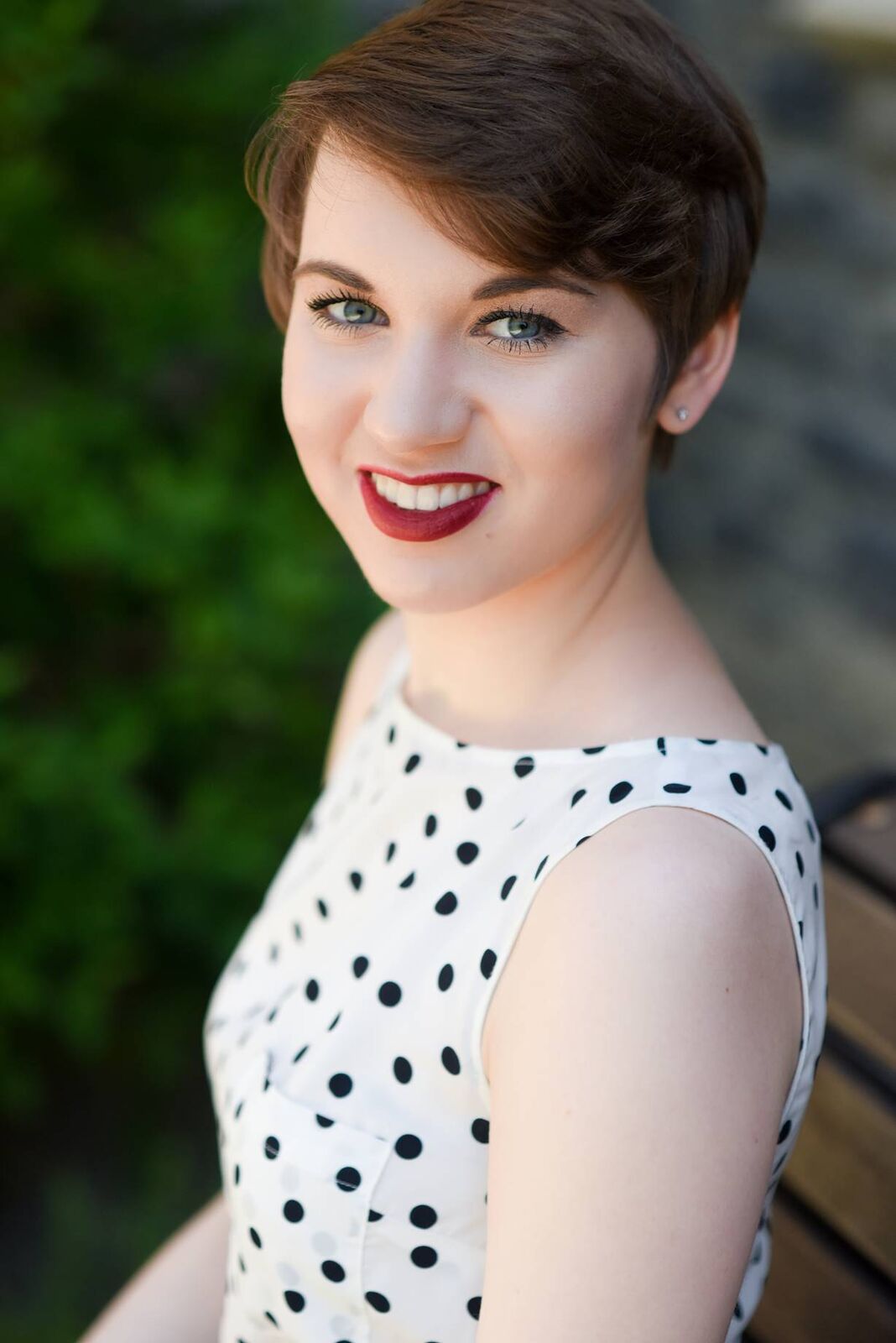
As I prepare to reflect on my time at Songfest — sitting on the Colburn School patio with the Los Angeles sun shining down on me (and leaving me with a pink-ish hue) — I cannot help feeling incredibly privileged and humbled to have been a part of such an inspiring month of music-making. Throughout the entirety of June, as one of roughly 100 vocalists, I have been challenged to strive towards vocal, musical, and artistic growth — a challenge that has been my sheer pleasure to undertake and would not have been possible without the generous assistance of the Art Song Foundation of Canada.
Being at Songfest was a uniquely rewarding experience for me as a growing young artist. Although I’ve spent many of my summers involved in voice programs, this was the first that I dedicated predominantly to the art of song, as opposed to being involved in operatic productions. This change of pace proved immeasurably worthwhile. While at the program, I was given opportunities to explore song repertoire with which I have long been enamoured and was exposed to new repertoire that I excitedly look forward to delving into.
With nearly 30 assigned pieces in seven languages, the program demanded a versatility of me that I consider invaluable and indeed crucial for this field. These assignments ranged from some of my “old favourites” — such as Schubert lieder and art songs by Samuel Barber — to newer projects that I was delighted to unpack, including works by faculty member Jake Heggie and a selection of Nordic repertoire (singing in Danish is no small feat!). Additionally, as one of four Colburn Recital Fellows, I was fortunate to spend a large amount of time preparing selections from Richard Strauss’ Brentano Lieder for a featured performance in the Songfest Recital Series, an immensely rewarding and enlightening experience. Being in a space that allowed me to be totally invested in such a wide array of repertoire had a huge impact on my development as a potential recitalist, both professionally and personally.
Throughout these four weeks, I have been incredibly fortunate to learn from master teachers and performers who have spent a lifetime unpacking the repertoire that I have just begun to explore. These encounters included public masterclasses with soprano Roberta Alexander, renowned collaborative pianists Martin Katz (University of Michigan) and Graham Johnson (Guildhall), contemporary composer Jake Heggie in a class of his own works, smaller group sessions with mezzo-soprano Suzanne Mentzer (San Francisco Conservatory), collaborative pianists Alan Smith (USC Thorton) and Kayo Iwama (Bard Conservatory), and baritone Sanford Sylvan (Juilliard), and private sessions with respected vocal instructor William McGraw (Cincinnati Conservatory), collaborative pianists Lisa Stepanova (University of Georgia), Javier Arrebola (Boston University) and Tony Cho (Oberlin Conservatory), as well as many of the aforementioned individuals.
Additionally, I was paired with seven young pianists with whom I was able to collaborate and discover repertoire — an experience that is incredibly valuable as a young artist beginning to bridge the gap from student to colleague. When I myself was not singing or performing, I was able to observe the other participants in their own masterclasses and recitals, which proved enormously illuminating (often, things are made clearer when you are not the person responsible for them!). From lectures on Nordic composition and managing your own business to mock-audition sessions and acting workshops, the amount of useful information made available throughout the program was staggering (and even necessitated a purchase of new pens!).
Being at Songfest was positively ideal for where I am right now in my musical ‘timeline’. Having just completed my undergraduate degree at the University of Toronto and preparing to begin graduate voice studies at Rice University, this interim period spent reflecting on my own artistry and the vastness of the vocal repertoire was a breath of fresh air that served to re-invigorate my passion for this field. As a developing singer, it is very easy to focus all one’s energy on the demands of opera —auditions, rehearsals, and productions. However, intentionally nurturing one’s interest in art song is an incredibly rewarding investment. As I have progressed in my studies, it has become increasingly evident that art song and opera have a complementary relationship in which each one provides what the other cannot, and that being attentive to both results in an informed symbiosis of individual artistry.
I would like to extend a hugely sincere ‘thank you’ to the Art Song Foundation of Canada for their immense dedication to Canada’s budding young artists. This month at Songfest has proved intensely valuable, and without the support of such foundations, Canadian musicians (including myself!) would be at a huge educational loss. I excitedly look forward to using all that I have learned throughout this program in my future endeavours, and consequently will strive to help buoy art song’s much deserved ranking amid some of classical music’s greatest masterpieces. Thank you again for your meaningful and important generosity.
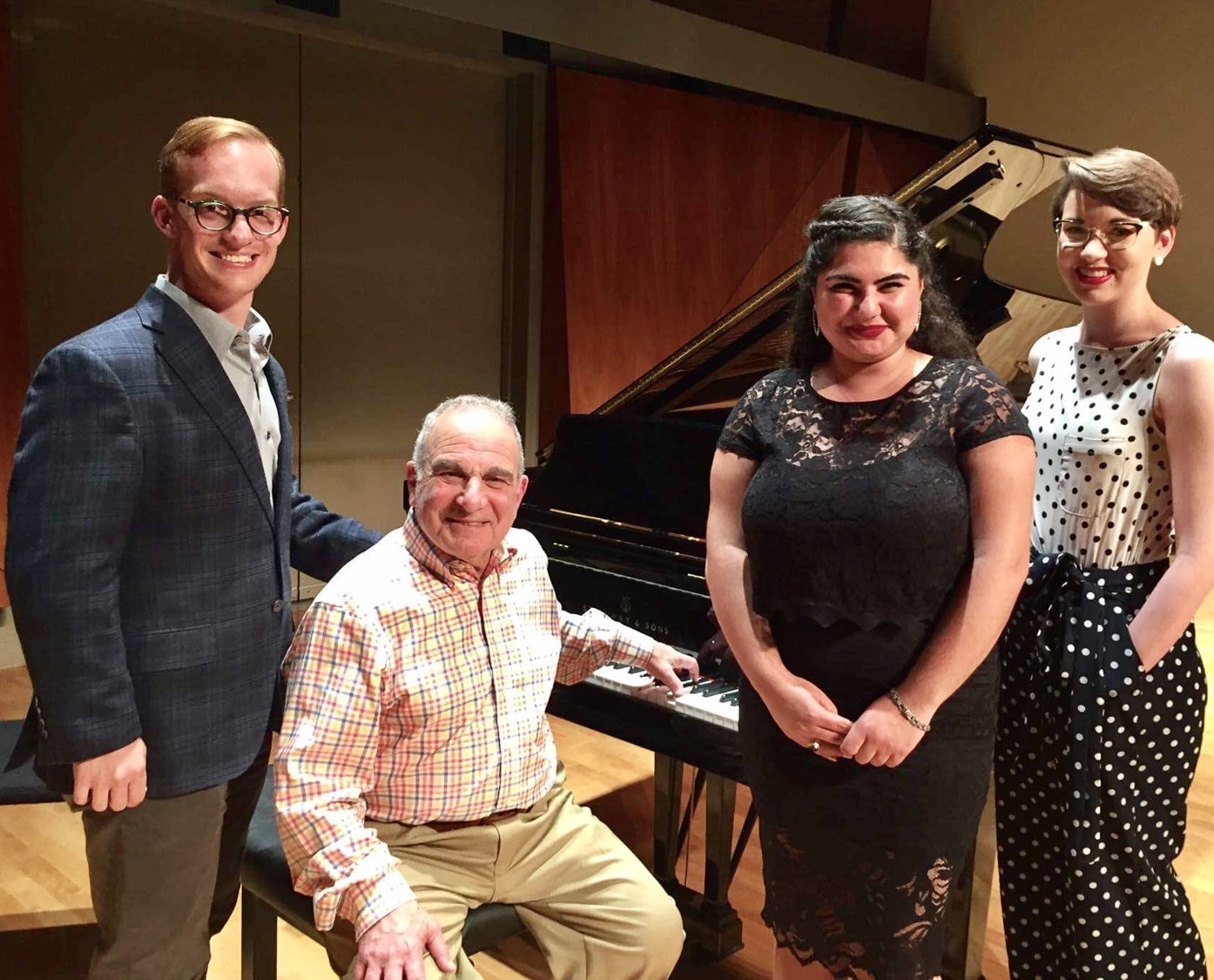
Piano fellows — 2017 Songfest — Sydney Baedke with Art Song Foundation of Canada bursary recipients and Martin Katz following a masterclass of American Art Song
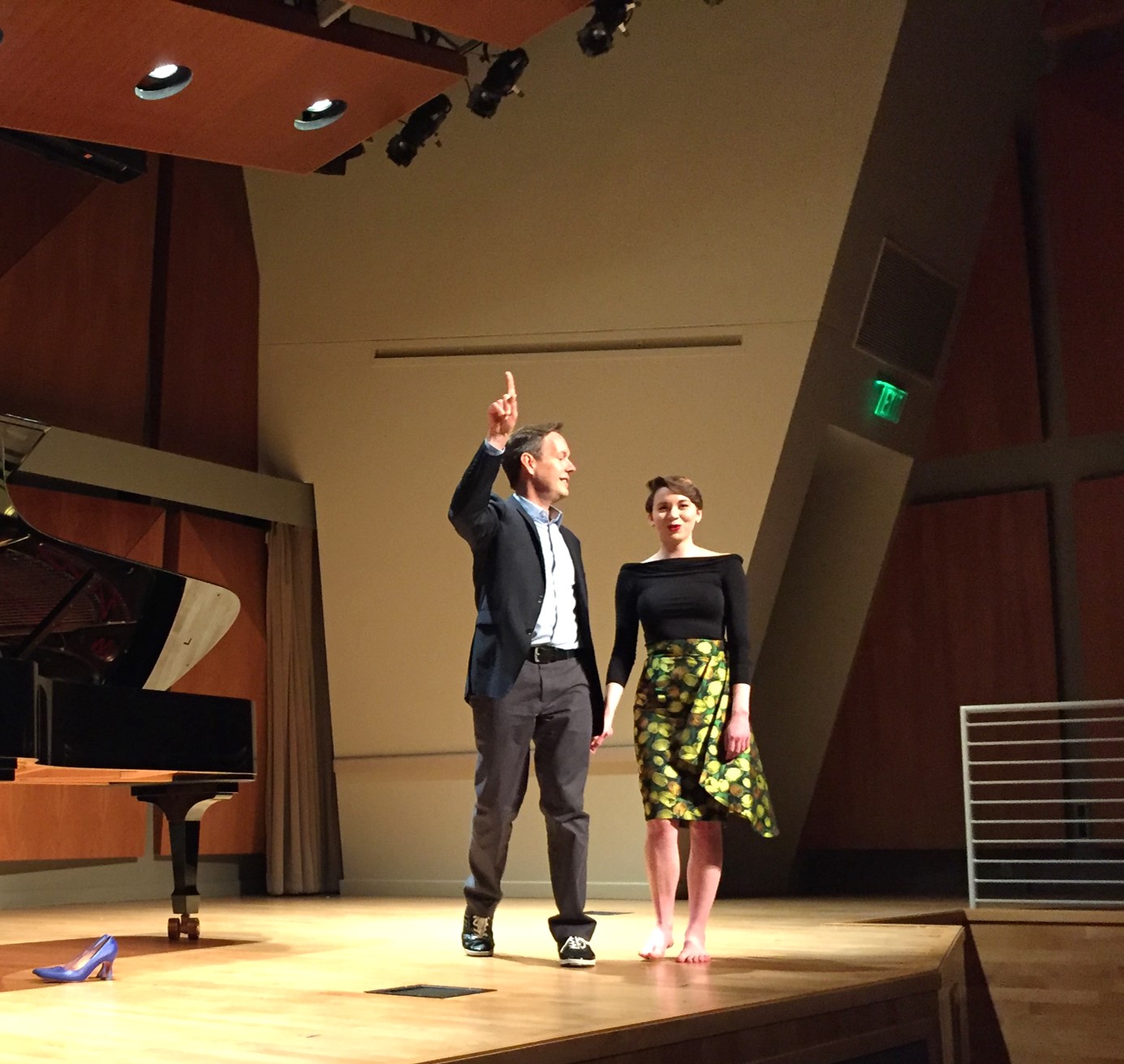
Sydney Baedke in masterclass with American composer Jake Heggie
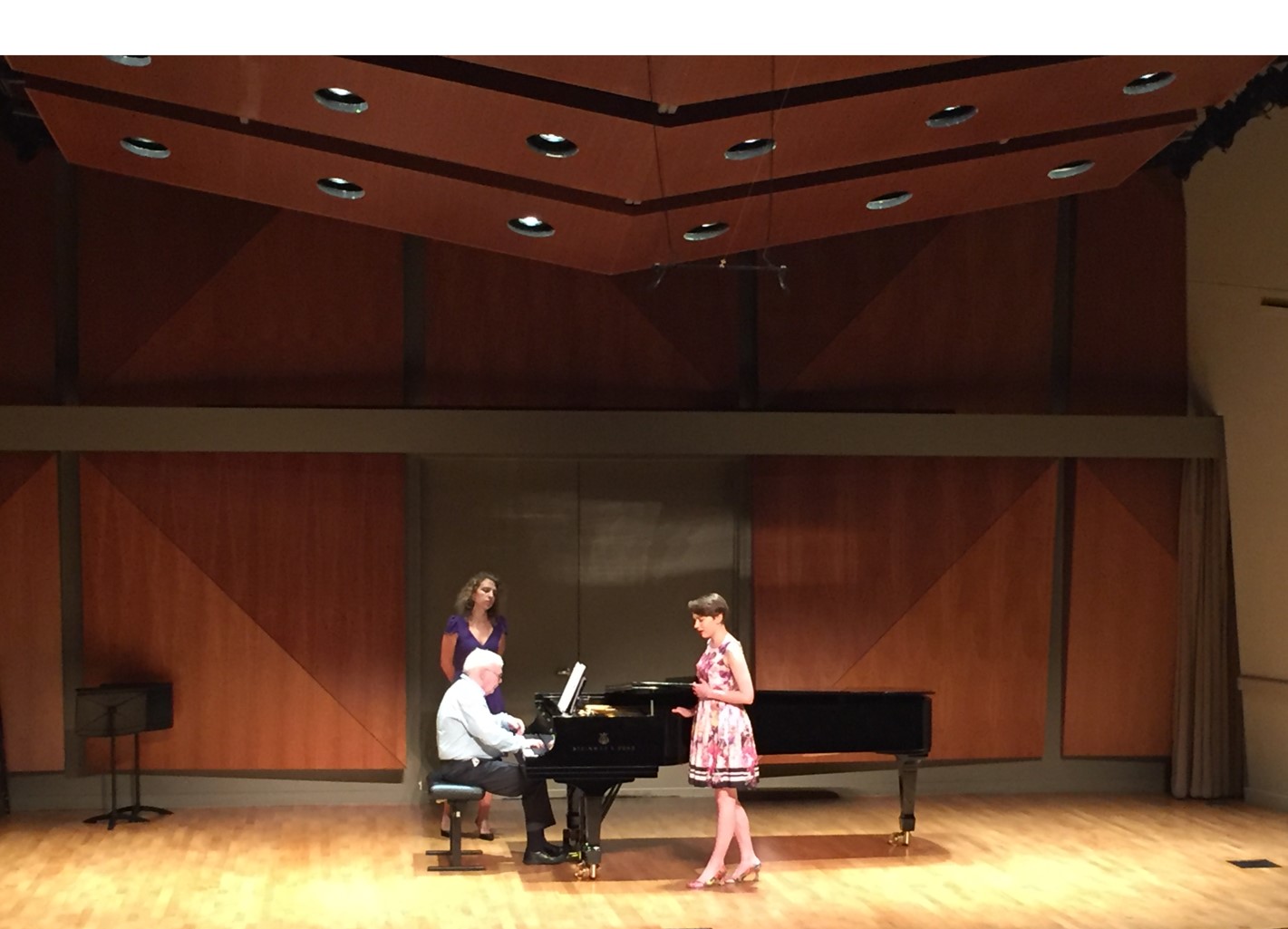
Masterclass of Schubert lieder with Graham Johnson
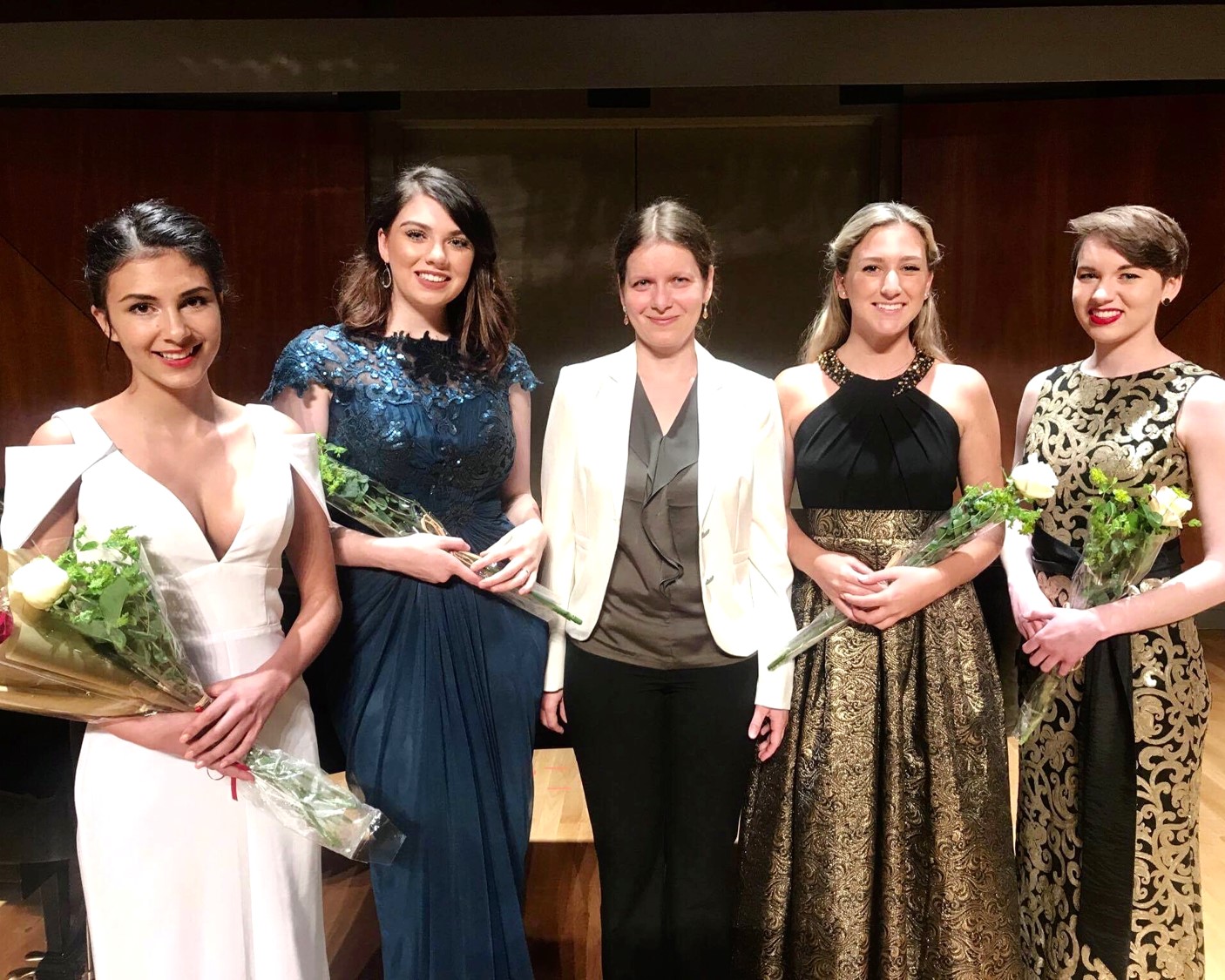
Sydney Baedke, right, with the 2017 Colburn Fellows and pianist Liza Stepanova following the Colburn Fellow Showcase Recital
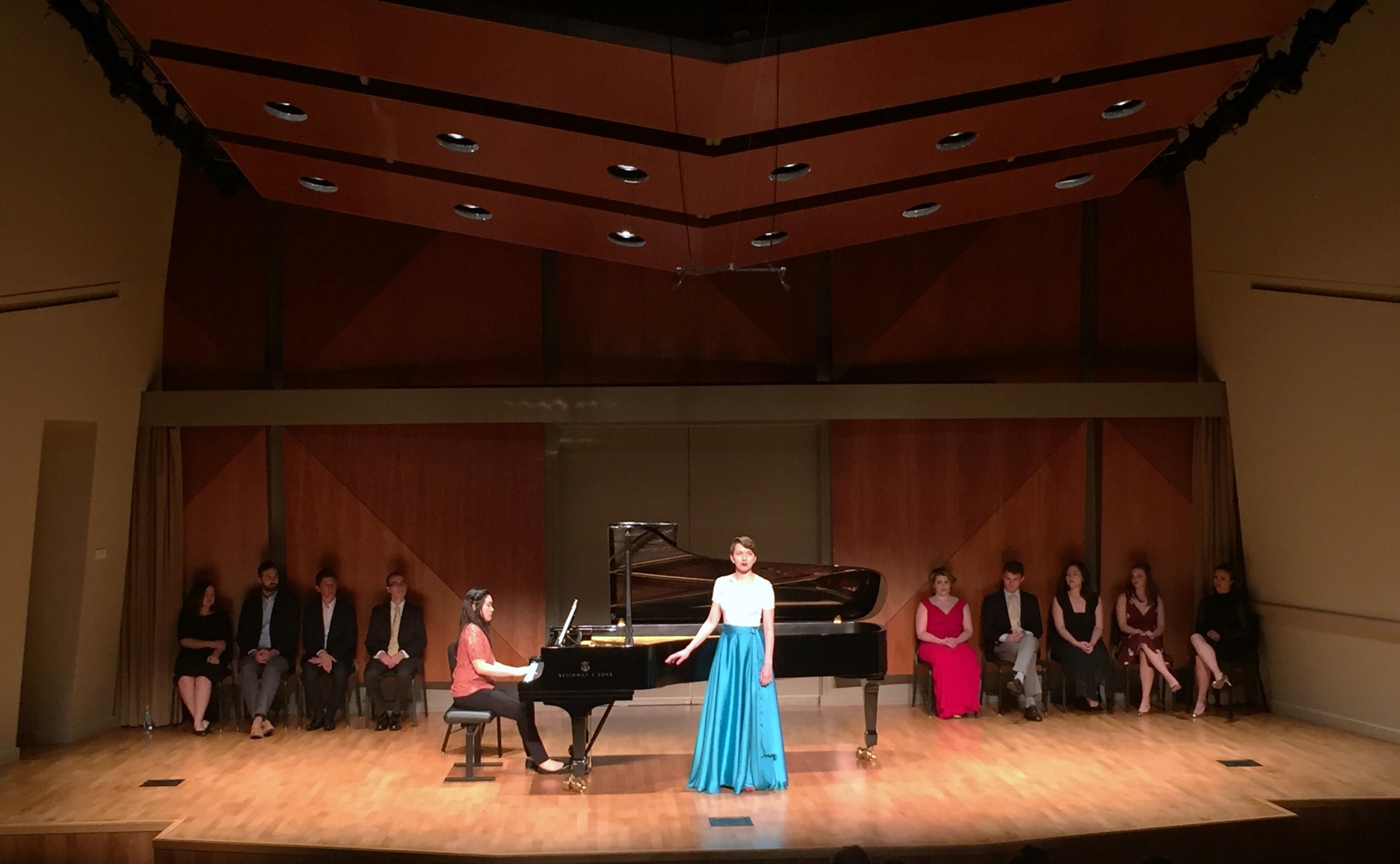
Sydney Baedke performing songs by Rachmaninoff in a showcase of Russian repertoire
Olivier Bergeron, baritone - Académie Francis Poulenc
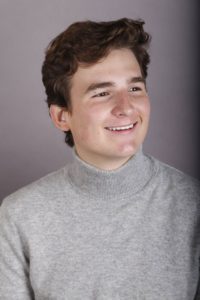 I was fortunate to receive the support of the Art Song Foundation of Canada, which allowed me to attend the Académie Francis Poulenc with my colleague and duo partner, pianist Alex Soloway. This proved to be a great experience for both of us, as we got to work on repertoire ranging from Fauré to contemporary works by Nicolas Chevereau, all on poems by Baudelaire, with distinguished pedagogues such as François Le Roux, Jeff Cohen, and Olivier Godin.
I was fortunate to receive the support of the Art Song Foundation of Canada, which allowed me to attend the Académie Francis Poulenc with my colleague and duo partner, pianist Alex Soloway. This proved to be a great experience for both of us, as we got to work on repertoire ranging from Fauré to contemporary works by Nicolas Chevereau, all on poems by Baudelaire, with distinguished pedagogues such as François Le Roux, Jeff Cohen, and Olivier Godin.
This time spent analysing the setting of Baudelaire by a wide range of composers from different eras was extremely interesting and allowed us to dive into the Baudelairean universe, which we rarely have to occasion to do so. We also had the opportunity to share our work in two concerts: one in Tours and one in Noizay.
I also want to let you know that I was finally able to meet again with Wolfgang Holzmair, after working with him two summers ago at the Domaine Forget, a program I was able to attend thanks to ASFC’s support. We just spent four days in Vienna working on Schubert lieder and it was very special.
I wish to thank the Art Song Foundation of Canada for their continued support and hope they will carry on their great work supporting young artists interested in art song for many years.
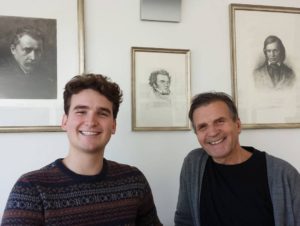
Baritone Olivier Bergeron with Wolfgang Holzmair in Vienna
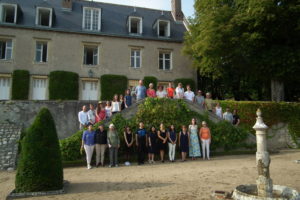
Group photo of Academie participants and staff in front of Francis Poulenc’s house, 26 August 2017
Florence Bourget, Mezzo-Soprano - Orford Summer Academy
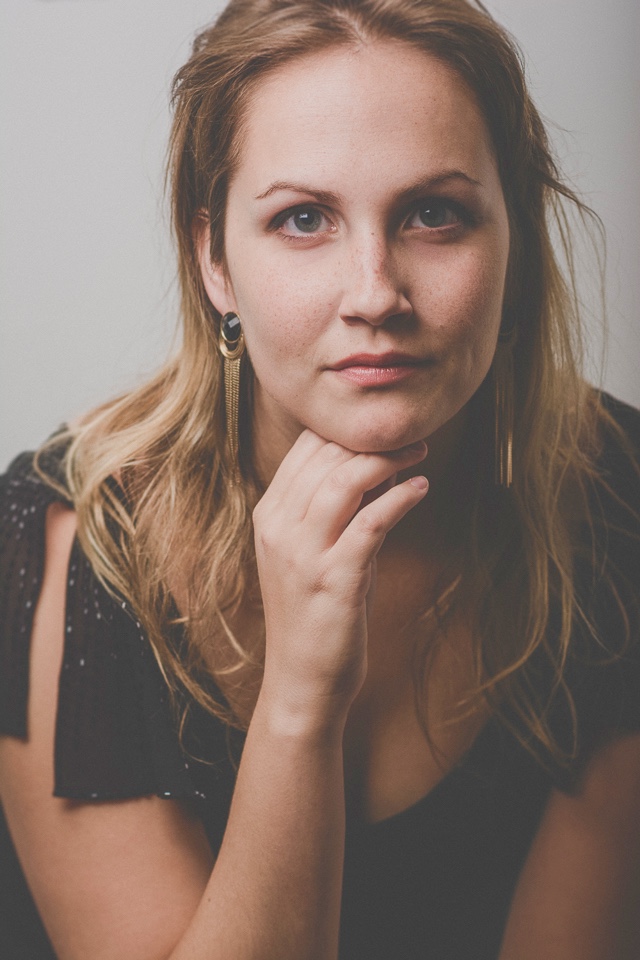
Je remercie du fond du coeur Art Song Foundation of Canada de m’avoir permis de vivre deux semaines de grande qualité à Orford Musique. Ces deux semaines intensives m’ont fait énormément grandir. Les expériences scéniques vécues à Orford m’ont permis de réaliser mon potentiel. C’est pourquoi j’en reviens avec la tête pleine d’idées et de créativité et le coeur confiant et toujours plus amoureux de la musique.
Pour la première semaine qui se concentrait sur les lieder allemands, j’ai été jumelé à deux pianistes : Gaspard Tanguay-Labrosse et Félix Marquis. Nous avions la chance d’avoir des coachings et des masterclasses tous les jours avec le célèbre pianiste et accompagnateur David Lutz de Vienne. J’ai eu également le grand plaisir de travailler avec Nathalie Paulin quotidiennement pendant les deux semaines de mon stage. Avec maître Lutz, j’ai pu travailler du répertoire magnifique comme les Kindertotenlieder de Gustav Mahler, ainsi que les Zwei Gesänge de Johannes Brahms. Nous avons eu un plaisir immense à explorer cette musique profonde ensemble. J’ai pu grandement travailler ma diction allemande.
La deuxième semaine était dirigé sur la mélodie française. Je travaillais en duo avec Mehdi Ghazi et nous avons eu la chance d’être guidés par Francis Perron et Nathalie Paulin. Grâce à eux, nous avons pu présenter en concert une grande partie du cycle Poème de l’amour et de la mer d’ Ernest Chausson. Ils nous ont également permis de faire de la musique de chambre en nous proposant des duos à deux voix et piano de musique française que nous avons aussi présenté en spectacle.
L’environnement d’Orford musique est extrêmement propice à l’apprentissage et à la créativité. Etre entourée par la forêt et les lacs ainsi inspire l’art et fait briller la musique. Merci de m’avoir permis de vivre ce stage inoubliable.
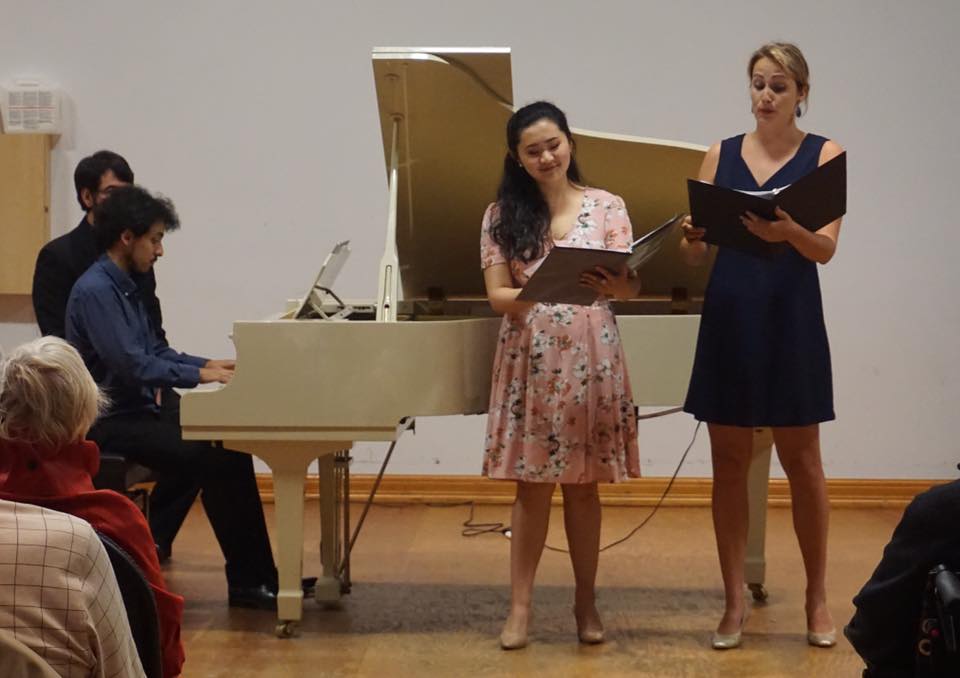
Sopranos Emily Zixing Wang and Florence Bourget with pianist Mehdi Ghazi
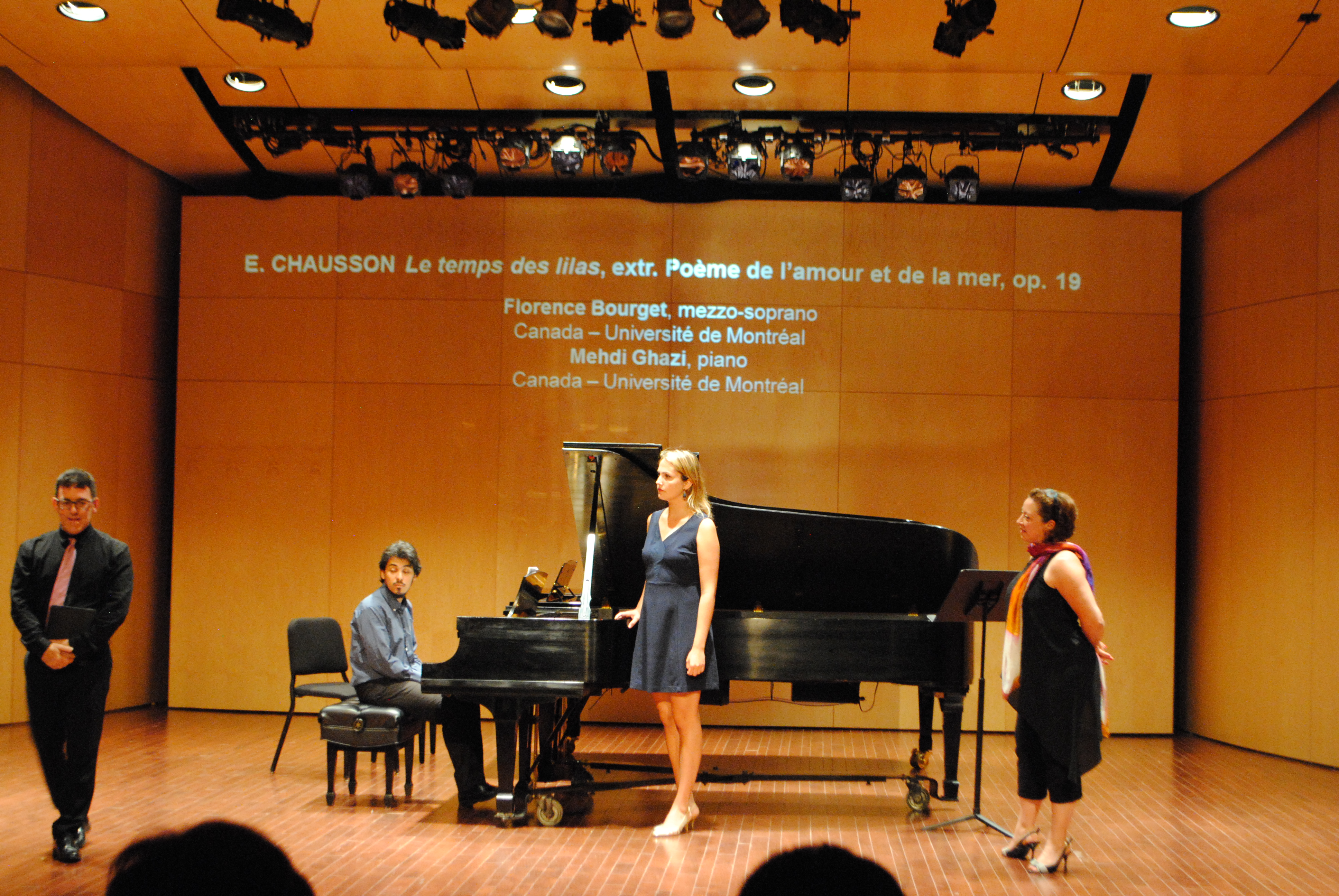
Soprano Florence Bourget and pianist Mehdi Ghazi in a public masterclass with Francis Perron and Nathalie Perron
Lindsay Connolly, Mezzo-Soprano - Barachois Summer Music Academy
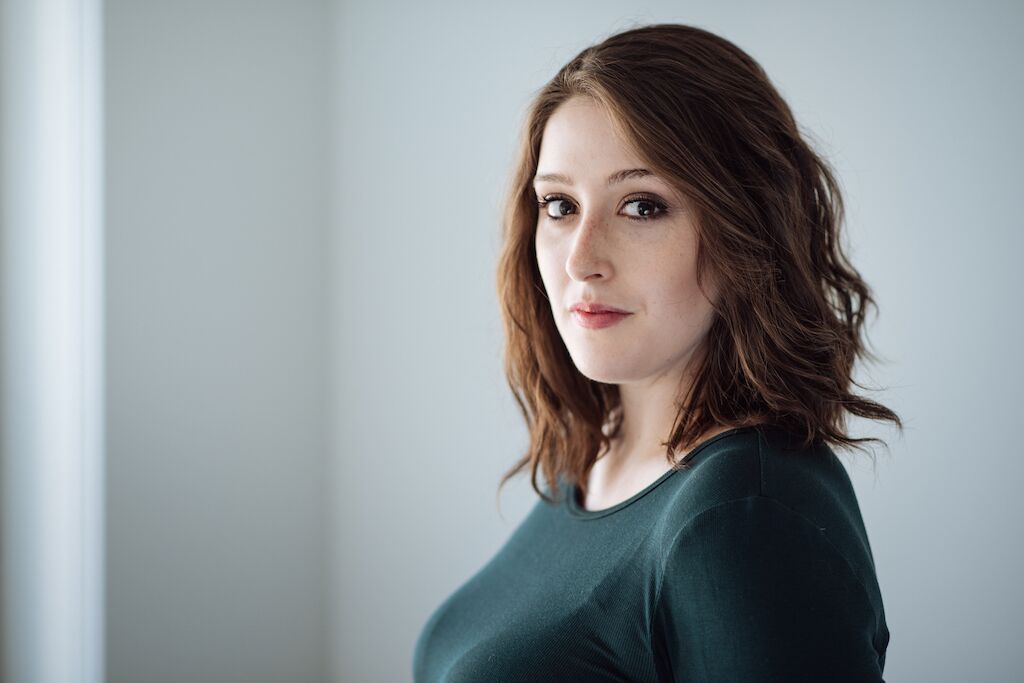
Thanks to the Art Song Foundation of Canada, I was able to spend the second week of July 2017 in beautiful Barachois, New Brunswick, at the Barachois Summer Music Academy. This program was one of the best experiences I’ve ever had, and I’ve learned so much more about myself personally and musically. We rehearsed and worked for five days, then had concerts over the next three days in Barachois and Fredericton, NB, and then in Charlottetown, PEI. Our group project was the Liebesleid-Lieder by John Greer, a 15-piece chamber work involving soprano, mezzo, tenor, baritone, and piano four hands. We also each had a 15-minute solo program to prepare with the pianist we were paired with. My pianist was Dakota Scott-Digout, and our program ended up being The Loon Song, an excerpt from Harry Somers’ Evocations, and three selections from Fantaisie dans Tous les Tons by Lionel Daunais.
This was the Barachois Summer Music Academy’s first year and it was led by the co-artistic director of the Barachois Festival Julien LeBlanc and soprano Nathalie Paulin. They initially invited two pianists and four singers, although one singer fell ill; so there ended up being just three. Each singer was paired with a pianist to work on the materials for our concerts at the end of the program and to work together during coachings, which we had every day with Julien LeBlanc. We also had a lesson every day with Nathalie Paulin, plus an hour of down-time, which we used for interpretive work or for, well, down-time. We spent our afternoons in group rehearsals on the Greer with both Nathalie Paulin and Julien LeBlanc.
Nathalie and Julien were incredibly generous with their time and advice, and held debriefings every night while we ate supper together and talked about how the program was going and what to expect from the next day. There were only five students at the program; so we became fast friends and developed strong connections. Our rehearsals were very productive, but a lot of fun as well, and I believe this made our performances better!
Some of my highlights from the week are:
• Being assigned to a collaborative duo and working on our pieces together. It really felt like a partner experience: going to coachings together and spending down-time working through trickier interpretive bits or learning more together about our composers.
• Working towards the concerts and being able to perform in two Maritime provinces with more than just one chance to perform together! We all became good friends and so the touring from Barachois to Fredericton to Charlottetown was a lot of fun. The concerts grew stronger as our confidence as an ensemble grew.
• Working on all-Canadian repertoire! This was my favourite part and, as a Canadian, I think it is so important that we perform more of our music. I learned about Canadian composers and poets this week, and I’m excited to explore even further into my cultural heritage.
Thank you so much to the Art Song Foundation of Canada for offering your support. Because of your generosity, I was able to enjoy spending my time at the Barachois Academy focussed solely on the music, rehearsals, and concerts.
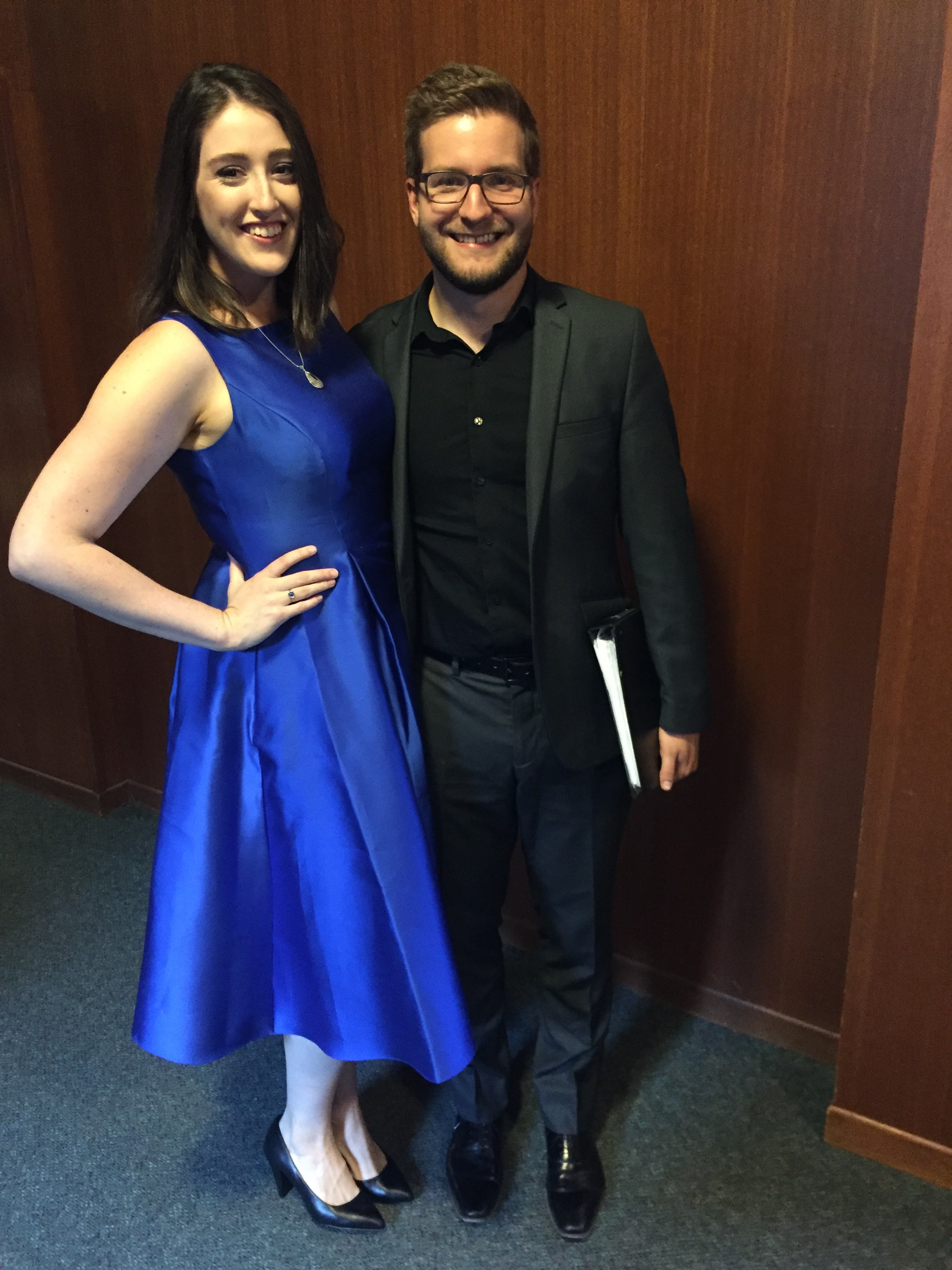
Lindsay Connolly and pianist Dakota Scott Digout before the concert in Charlottetown, PEI
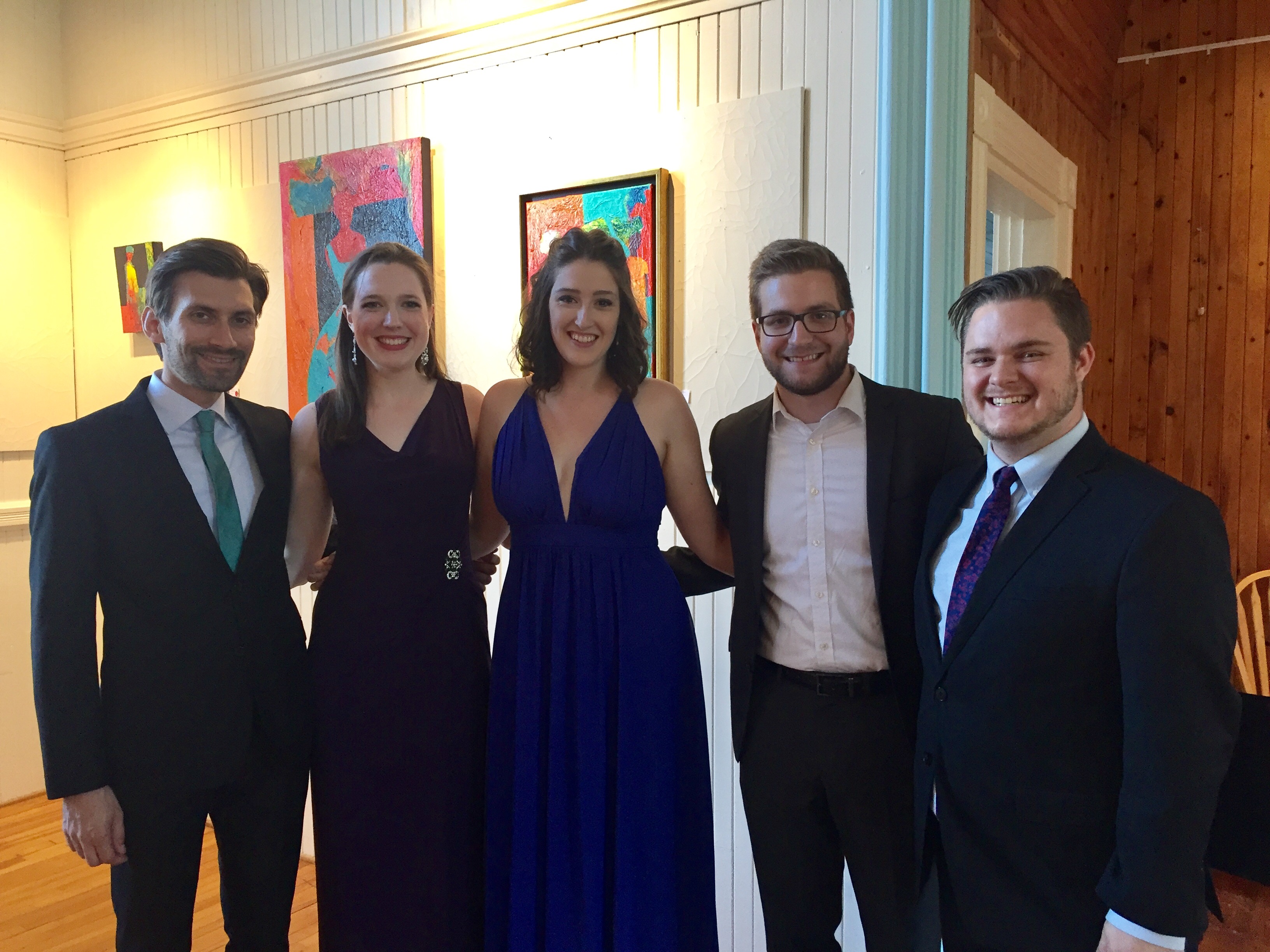
Barachois participants: pianist Benjamin Bertin, soprano Julie Ekker, mezzo Lindsay Connolly, pianist Dakota Scott Digout, tenor Patrick McGill
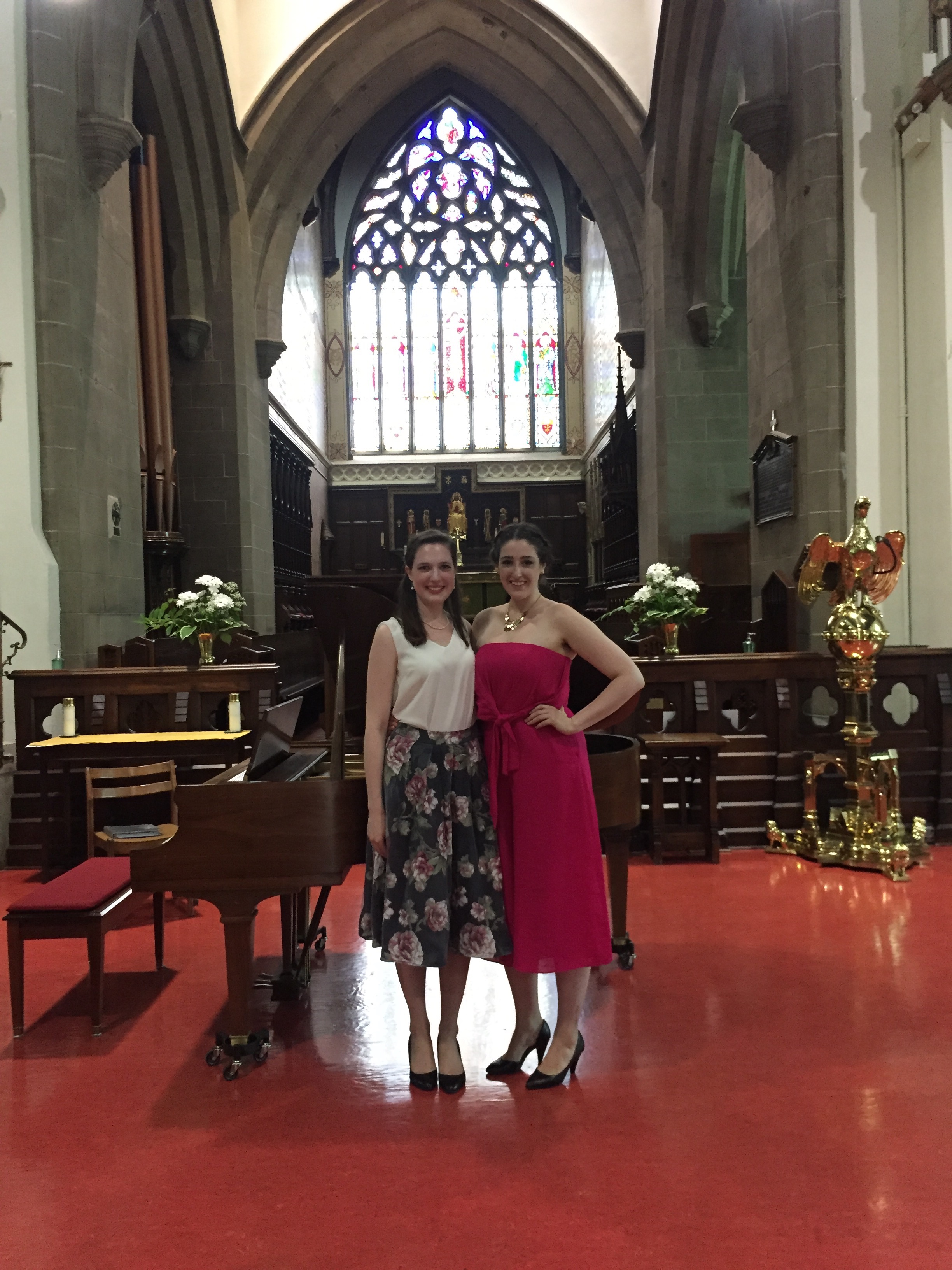
Lindsay Connolly and mezzo Julie Ekker in the Fredericton, NB concert venue
Ylan Chu, Piano - Orford Summer Academy
 I would like to thank the Art Song Foundation of Canada for their generous support in funding my studies at Orford Music’s Voice and Piano Duet Workshop. With this bursary, I was able to participate in an intense two weeks of daily lessons, masterclasses, rehearsals, and performances.
I would like to thank the Art Song Foundation of Canada for their generous support in funding my studies at Orford Music’s Voice and Piano Duet Workshop. With this bursary, I was able to participate in an intense two weeks of daily lessons, masterclasses, rehearsals, and performances.
I collaborated with bass-baritone Kevin Burke, my duo partner from Ottawa. The first week focused on German Lieder with Professors David Lutz and Nathalie Paulin. Each day, we had either two lessons (one with each professor) or one lesson (with one professor) plus a performance in a masterclass (with the other professor). Each week culminated in a final studio concert.
The second week focused on French mélodies with Professors Francis Perron and Nathalie Paulin. This week was a little bit different. On top of our duos, since most students were familiar with each other at this point, we were placed in groups (one pianist and two singers) to do quick studies of trios for the final concert. We also had a donor-relations event in Georgeville. Every day, we had two lessons (one with each professor) along with a group warm-up in the morning and an ensemble coaching in the afternoon. I enjoyed this packed schedule because we had the opportunity to work with each professor in private lessons or coachings at least once a day. This allowed us to cover a lot of repertoire in a short period of time, and we saw our rapid progress from one day to the next.
The three professors took such great care of all of us during our stay. Their passion for teaching and their knowledge of art song will remain with us as we grow into our music. As a duo, Kevin and I were asked to perform in many concerts during the session: two final studio concerts, Orford sur la route (in Saint-Catherine-de-Hatley), Beaux concerts de la relève (in Salle Gilles-Lefebvre), and a public masterclass with Professors Nathalie Paulin and Francis Perron (in Salle Gilles-Lefebvre).
We still managed to have a lot of fun during the process — late night practice and research sessions, meeting new friends, going on hikes, and visiting nearby towns in Québec on the weekend.
As a solo pianist and collaborative artist, I am grateful for the opportunity to develop my skills and work with such talented pedagogues and colleagues. I was immersed in music and nature for these two weeks and had an incredible time learning and performing. Thank you, once again, to the Art Song Foundation of Canada for supporting young artists in their creative endeavours. Your generosity encourages us to continue pursuing our greatest passions and allows us to share the music we love.
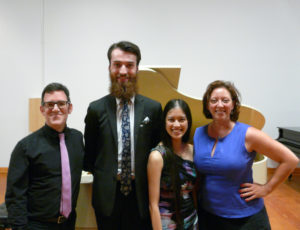
Professor Francis Perron (piano), Kevin Burke, bass-baritone, Ylan Chu, piano, and Professor Nathalie Paulin, (voice) after the final concert
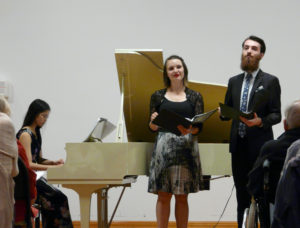
Ylan Chu, piano, McKenzie Warriner, soprano, and Kevin Burke, bass-baritone, performing a trio at the Studio Concert
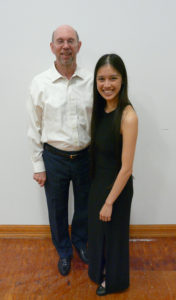
Professor David Lutz and pianist Ylan Chu
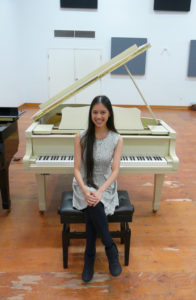
Pianist Ylan Chu in a rehearsal studio (with a cookies and cream-coloured piano!)
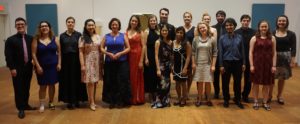
Participants In the second week of Orford Music Voice and Piano Duet Workshop with Professors Francis Perron and Nathalie Paulin
Geoffrey Conquer, Piano - Songfest
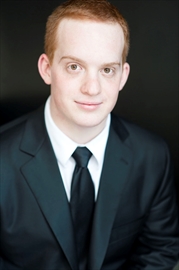
Thanks to the support of the Art Song Foundation of Canada, I was able to attend SongFest this past June in Los Angeles, the first music program I have ever attended in the United States. It was a very intense month full of learning, working with incredible experts on art-song repertoire, coaching with composers on their compositions, and collaborating with 15 fantastic singers.
At SongFest, we often had two or three master classes a day. Through these, I got to expand my knowledge of the repertoire by listening to many fantastic performances of songs by my colleagues and hearing what leading artists in this field such as Martin Katz, Graham Johnson, Roberta Alexander, Susanne Mentzer, Sanford Sylvan, Dr. Alan Smith, Bill McGraw, Liza Stepanova, and Kayo Iwama had to say.
In addition to numerous wonderful private coachings with these aforementioned artists, a highlight for me was discovering the amazing vocal music of American composers Charles Ives, Libby Larsen, and Jake Heggie. Graham Johnson playing Schubert also left a huge impression on me, as I felt that I was hearing Schubert for the first time. A very memorable master class was one on Barber with Martin Katz, where I got to perform A Green Lowland of Pianos and Nuvoletta; he really opened my eyes in Samuel Barber’s music through his coaching and there were a lot of smiles from everyone.
The Colburn School is an incredible facility, and both living and working in close quarters with colleagues meant that a lot of new friendships and professional relationships began. I got to greatly expand my network through this program. In October of this year, I will travel to DePauw University and record three of Libby Larsen’s works with tenor Blake Beckemeyer, at her request.
Thank you again for the bursary, which allowed me to participate in such an important program at the beginning of my career in this field. I am very grateful and will not forget the profound impact SongFest made on me as an artist.
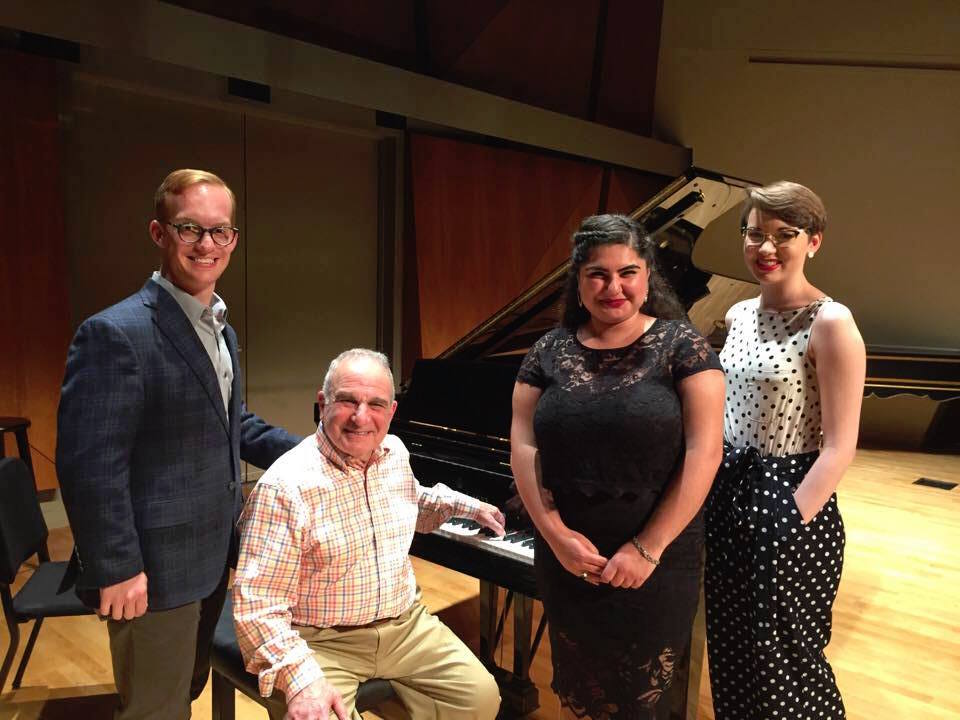
Three Canadians with Martin Katz after the Samuel Barber masterclass.
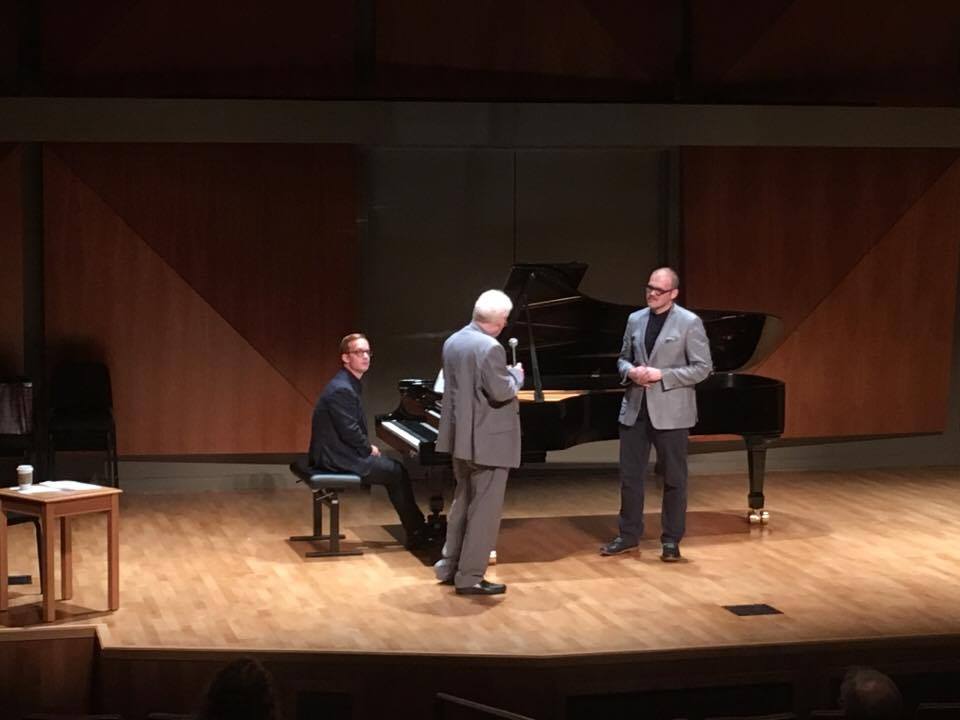
Pianist Geoffrey Conquer with baritone Joshua Quinn during Graham Johnson’s masterclass on Wolf.
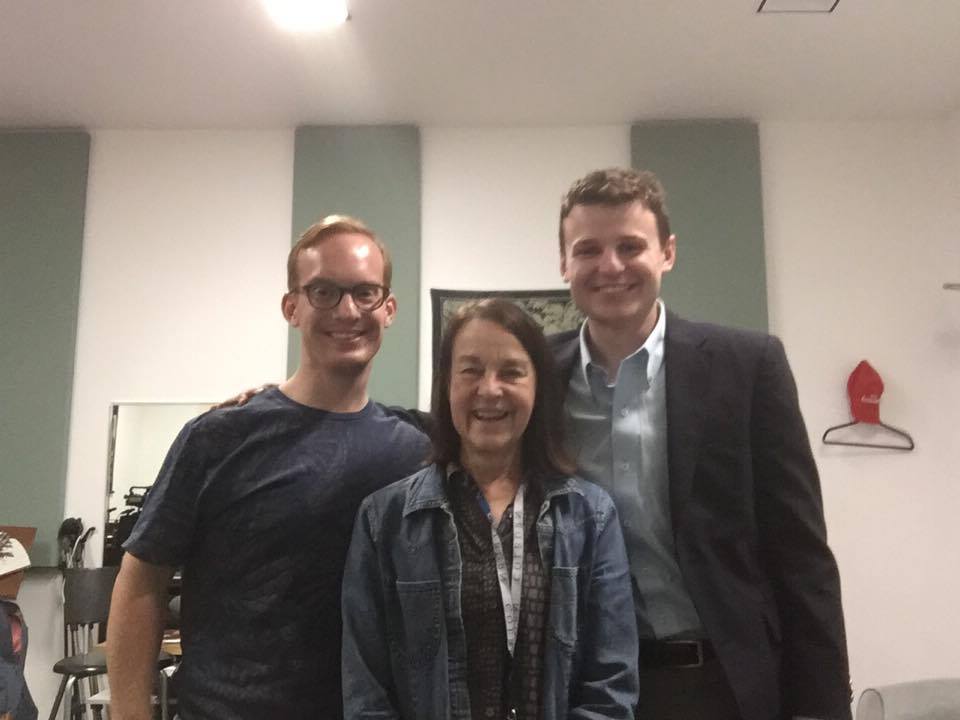
Geoffrey Conquer, Libby Larsen, and tenor Blake Beckemeyer
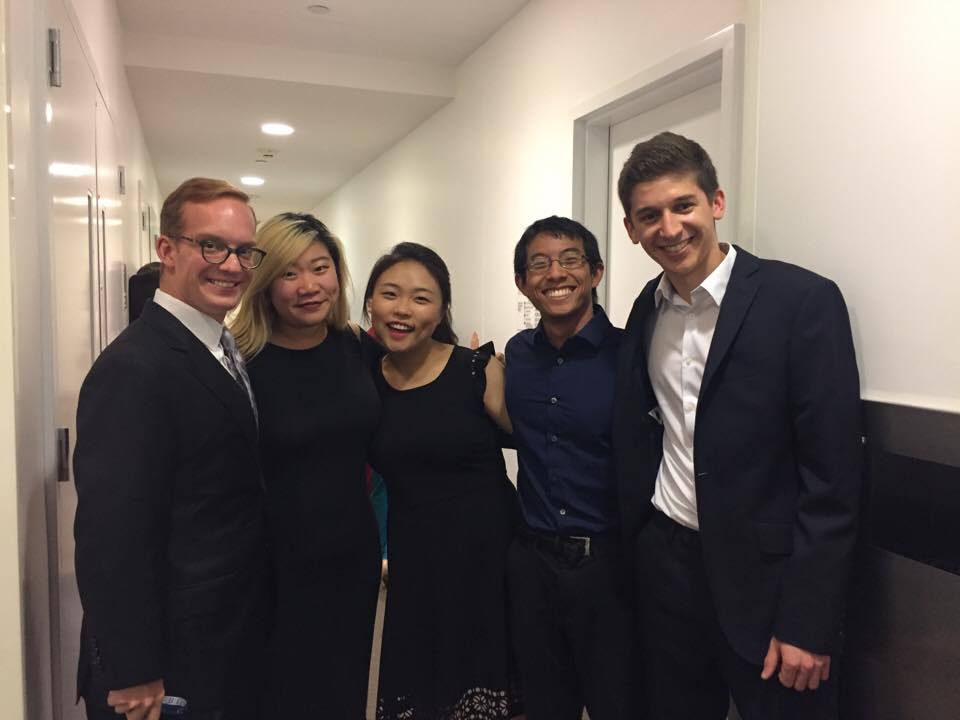
Pianist Geoffrey Conquer with other Songfest pianists after the Liszt concert
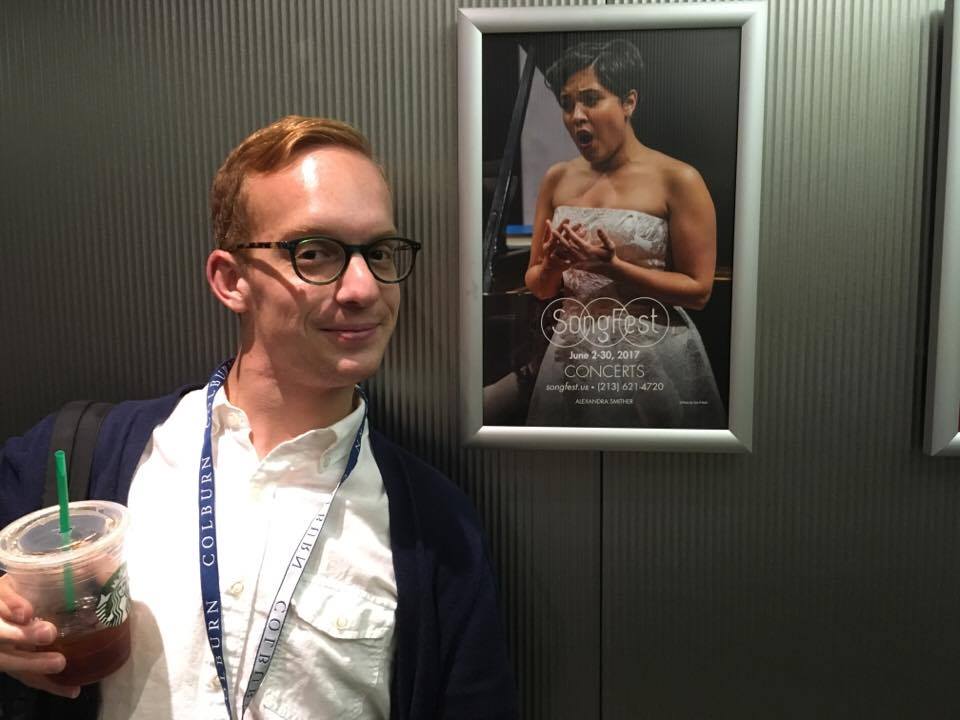
Geoffrey Conquer with fellow Canadian and ASFC recipient, soprano Alexandra Smith in the elevator.
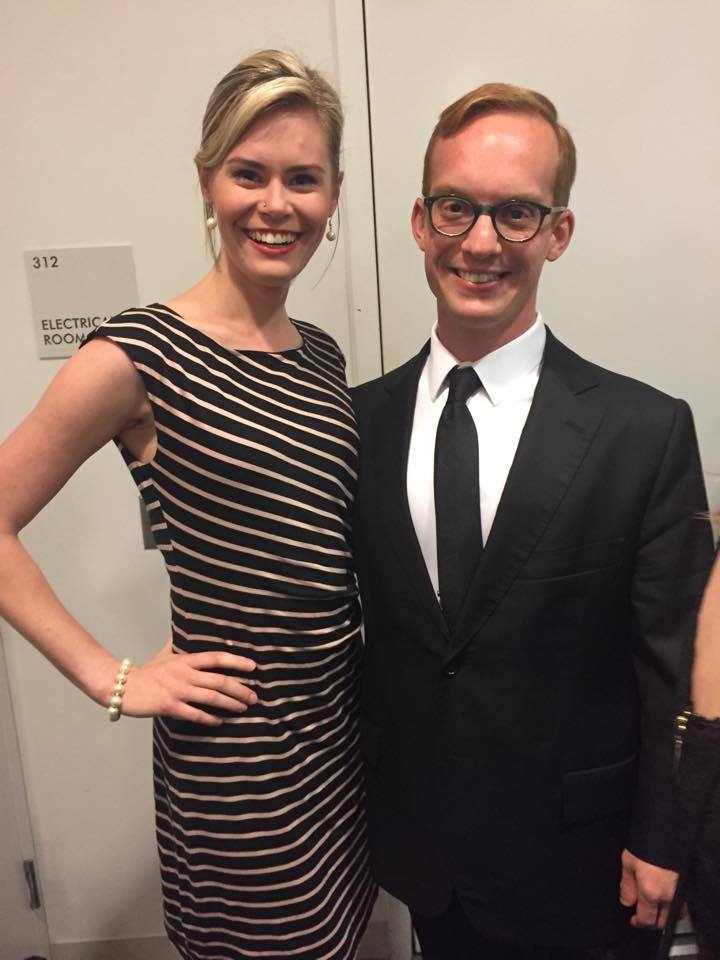
Geoffrey Conquer and soprano Tabitha Burchett after performing Sibelius.
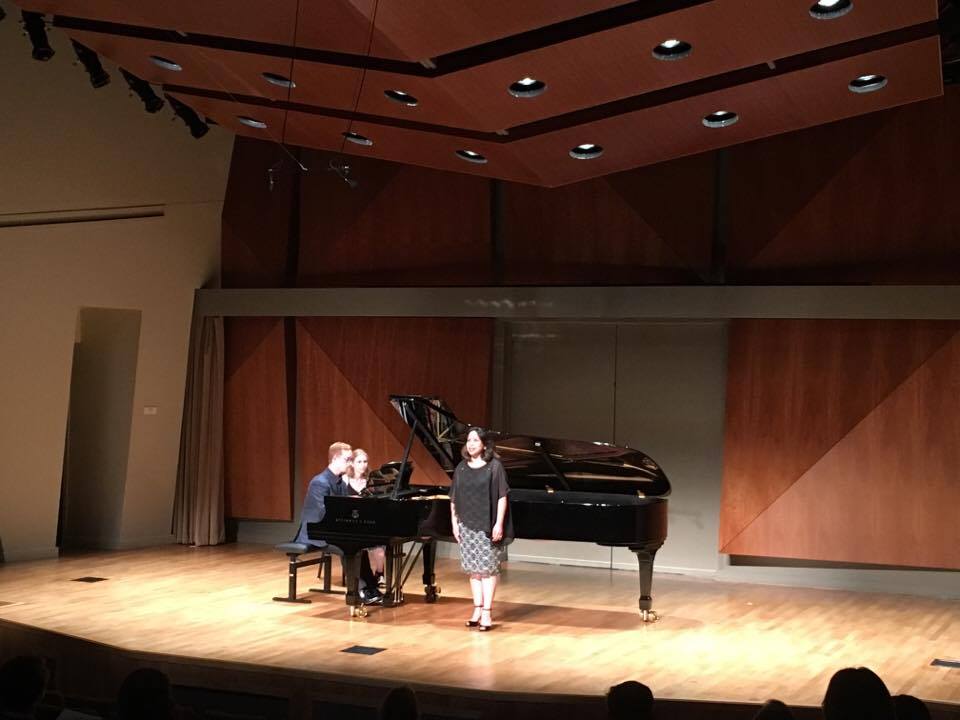
Pianist Geoffrey Conquer and soprano Stella Roden in the New American Music recital
Nicola Davies, Piano - Franz Schubert Institut
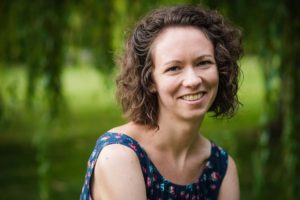 Attending the Franz Schubert Institut in Baden bei Wien, Austria, was a life-changing experience and perfect transition from finishing a Master’s degree into working on my own. It allowed me to work through habits that had become engrained through my degree, and to start to solve problems in my own words.
Attending the Franz Schubert Institut in Baden bei Wien, Austria, was a life-changing experience and perfect transition from finishing a Master’s degree into working on my own. It allowed me to work through habits that had become engrained through my degree, and to start to solve problems in my own words.
Every day of the program, we started with a poetry class led by Deen Larsen; the rest of the day was taken up by two masterclasses with the master teacher, one or two coachings with the resident coaches for language, piano, and voice, rehearsal time with our duo partner, or personal practice. We spent five weeks together as a group, with a new master teacher every three days. There were also a few excursions built into the program, such as performing in the stunningly beautiful hall at Heiligenkreuz Abbey, several hikes, and a boat ride on the Danube.
The consistent schedule allowed us to really focus on one thing without distractions: studying Lieder in preparation for work with the master teachers. As collaborative pianists, we are usually working with many different singers and instrumentalists, and it was wonderful to spend five weeks working only with my duo partner. I have a much stronger sense now of how to find subtlety and variation in music, particularly through my work on strophic songs. The daily poetry class was eye-opening and made me realize the wealth of history I know little about; it introduced us to new ideas, encouraging us to think creatively about the poems we studied. As musicians studying art song, we don’t usually spend much time focused on poetry, as our teachers are primarily musicians. This program also made me realize how important language study with native speakers is.
Receiving the bursary from Art Song Foundation made attending the Schubert Institut manageable, and also made it possible for me to save a little for a week of travelling in Italy after the program, which was life changing in different ways. For one thing, having never been to Italy or Austria, I found the ‘feel’ of these countries strikingly different, and I better understand the different styles of music that have come from both of these countries.
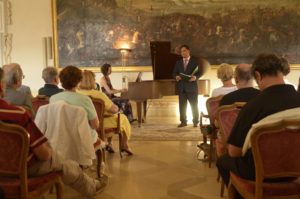
Nicola Davies and Oliver Munar performing at Heiligenkreuz Abbey
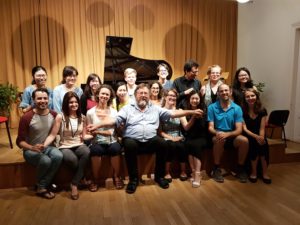
Pianists at the 2017 Franz Schubert Institut with Robert Holl, Dutch bass-baritone and Schubert specialist
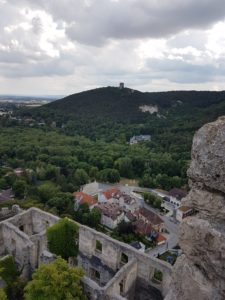
Castle ruins near Baden on one of our group hikes
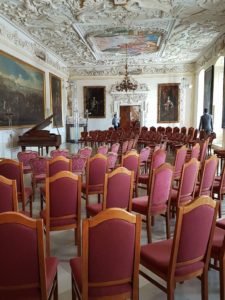
Performance Hall at Heiligenkreuz Abbey
Pierre-André Doucet, Piano - Songfest Winter Intensive

Thanks to the support of the Art Song Foundation, I was able to attend Songfest’s brand-new Winter Intensive at Hidden Valley, CA, and take part in a full week of very intimate and informative coachings, lectures, masterclasses, and concerts, all under the guidance of the world’s leading experts on Schubert Lieder: Graham Johnson and Sir Thomas Allen. Their insights were both profound and human, and working with them as part of a very select group (approximately a dozen singers and five pianists) allowed us to fully bask in their knowledge and generous expertise.
The course’s small group size also allowed me to spend more time living and working with some of North America’s finest young singers and pianists, therefore expanding and deepening my network of colleagues. During the residency, my musical partners included sopranos Alexandra Smither, Sarah Davis, Katharine Dain, and Victoria Browers, tenors James Onstad, Lucas van Lierop, and Ricky Ricardo Garcia, baritone John Tibbetts, and bass-baritone Matthew Stump, as well as pianists Jennifer Szeto and Nikolay Verevkin.
The Art Song Foundation of Canada’s support was pivotal in allowing me to attend Songfest’s Winter Intensive. Without it, I absolutely could not have financed this project.
In closing, thank you once again for offering me this bursary and allowing me to take part in such an important opportunity. Moving forward, I am certain this project will have positive repercussions on my career and am extremely grateful to the Art Song Foundation of Canada for their support.
 Piano fellows — 2017 Songfest Winter Intensive — Jennifer Szeto, Pierre-André Doucet, Taylor Hutchison, Nikolay Verevkin, and Gloria |
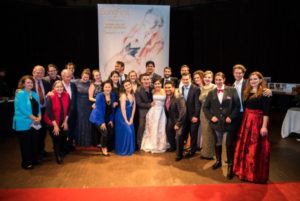 Fellows and faculty of the 2017 Songfest Winter Intensive at Hidden Valley, CA |
 Fellows with professor Graham Johnson after the Die Schöne Winterreise concert.jpg |
 Alexandra Smither, soprano, and Pierre-André Doucet, piano.jpg |
 A group of fellows after concert of excerpts from Die Schöne Müllerin and Die Winterreise , with professor Graham Johnson |
 Sarah Davis, soprano, and Pierre-André Doucet, piano |
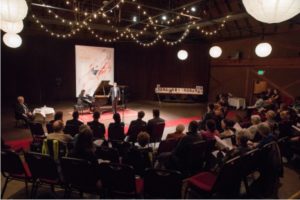 Songfest Winter Intensive Class at Hidden Valley, CA |
Julie Ekker, Soprano - Barachois Summer Music Academy
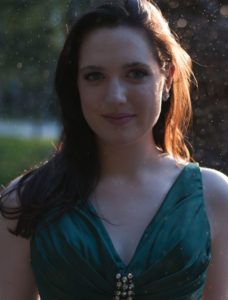 How inspiring and gratifying it was to be part of the Barachois Summer Music Vocal Academy for its very first year!
How inspiring and gratifying it was to be part of the Barachois Summer Music Vocal Academy for its very first year!
For a week, young aspiring singers and pianists were gathered to work together under the guidance of soprano Nathalie Paulin and pianist Julien Leblanc on Canadian art songs. These were performed for the Barachois Summer Music Festival at the Église Historique de Barachois, New Brunswick, as well as other venues such as the Christ Church Cathedral in Fredericton, New Brunswick, and the St James Presbyterian Church in Charlottetown, PEI. Each singer was paired with a pianist to work on their selected Canadian art songs. I worked on a selection of songs from Jacques Hétu’s song cycle Les Clartés de la nuit. These selections were Thème sentimental, Les Corbeaux, and Soir d’hiver. We also had the opportunity to work all together on John Greer’s Liebeslied-Lieder, a song cycle for vocal quartet and piano four hands.
Every morning as of Saturday July 8th to Tuesday July 11th between 10am to 1pm, each singer had 30 minutes to an hour worth of private lessons with Nathalie Paulin while the pianists had a coaching with Julien Leblanc. In the afternoon, usually between 2pm to 4pm, we had masterclasses on our collaborative pieces with Nathalie Paulin and Julien Leblanc or work on the text with Robert Lapp. We also had a rehearsal for the Greer Song cycle afterwards between 4pm to 5:30pm. These rehearsals and lessons were first taking place at the Music Faculty of the University of Moncton (Saturday July 8th and Sunday July 9th) and then all our other rehearsals were at the Église Historique de Barachois. On Wednesday July 12th, we had our usual morning schedule but in the afternoon we had our dress rehearsal from 2:30pm to 4pm. During the evenings, we had time to explore beautiful New Brunswick and enjoy each other’s company.
Being part of a small group of four singers and two pianists really was beneficial so we could each have a rightful amount of time to work thoroughly with these terrific mentors and to really connect with one another. Thursday July 13th was our first concert in Barachois at 7:30pm. Friday July 14th, we did a noon hour concert in Fredericton, and Saturday July 15th we had our final concert in Charlottetown at 7:30pm.
I am truly happy to have been selected to be part of an excellent group of singers and pianist for the Barachois Summer Music Vocal Academy. Each member of the group shared their ideas and approach about the repertoire and was open to learn and explore other possibilities. I also enjoyed having the chance to be introduced to the Canadian art song repertoire, something that should be done more often because there are so many wonderful pieces.
In the end, all the hard work paid off with three amazing concerts. The audience was pleased of the diversity of music from each of these Canadian composers. I am grateful for the hard work Nathalie Paulin and Julien Leblanc have put to make this academy happen. Being only its first year, I am impressed by how well organised it has been and the amount of insight I have gotten from it.
I am truly grateful that the Art Song Foundation of Canada was able to support me for this experience. This program opened my eyes to Canadian art song and I now look forward to dive further into the repertoire for future recitals.
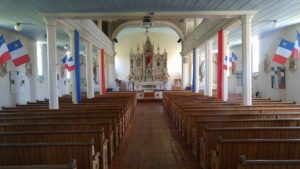
Barachois Historic Church, Barachois, NB (concert venue)
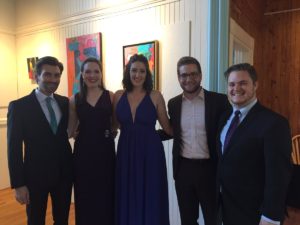
Barachois Participants — pianist Benjamin Bertin, soprano Julie Ekker, mezzo Lindsay Connolly, pianist Dakota Scott-Digout, tenor Patrick McGill
Rachel Fenlon, Soprano & Pianist - Oxford Lieder Festival
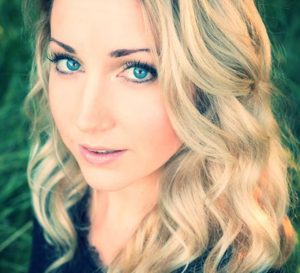
This autumn, I had the pleasure of participating as a young artist in the Oxford Lieder Festival’s Young Artist Mastercourse. I was invited as a pianist and a singer, specifically to accompany myself, which was a first for the festival and a great experience for me to work in great detail with such esteemed faculty on a project that has, for the most part, been self-directed.
The ten-day intensive was hosted on the campus of Oxford University and centred around two aspects: daily masterclasses with Ann Murray and the visiting masters (Roger Vignoles, Eugene Asti, and Richard Jackson), and attending evening concerts, lunchtime concerts, and late-night concerts of the festival and its guest artists. I found the pairing of seven-hour masterclasses during the day with attending recitals an enormously helpful ground for growth as a young artist; we saw world-class Lieder artists (Ian Bostridge, Sylvia Schwarz, Malcolm Martinueau, Roderick Williams, Julius Drake, Iain Burnside — the list goes on . . .) put into action all that we had been discovering during the day.
As it was the first time for the entire faculty to work with a singer who accompanies herself on the piano, what I found very enlightening was how each teacher addressed this. Where they found weaknesses and what they viewed as strengths varied from teacher to teacher, and this in itself divulged the great many choices I have ahead of me as I go forward. Do I place the piano this way? Do I perform from memory as a rule? Do I ever make eye contact with the audience? Is there an instrument which is sacrificed more? If so, can we negotiate and accept those sacrifices? The questions were thought-out and these endless questions brought me closer to conceiving it fully.
The unified goal of each teacher was to get me to communicate as intimately and as simply as possible, and the ways in which we each approached this was tremendously helpful. Ann Murray would focus a lot on my singing, and the support of the phrases, and in particular, working on Frauenliebe und Leben by Robert Schumann with her opened up a new world for me with this song cycle, for this cycle is in Ann’s repertoire. As a result, she opened up my imagination to bring this woman so much more vividly to life. Roger Vignoles felt that it was very appropriate for a singer to accompany themselves in Schumann, and in fact disclosed that he had entertained the idea once or twice before. The revelation with Vignoles was that the piano was to be a part of, to be included in the character and the interpretation of these songs (the actual machine itself). For example, in the “Seit ich ihn gesehen” of Frauenliebe und Leben, she is in fact the kind of woman who, on falling in love, sits at the piano to sing about it. This was a revelation to me; before this, I had viewed the instrument as merely an instrument, a means to express something beyond. The inclusion of it physically enlightened a whole new way of interpreting songs from the piano. I now feel that the piano is much more unified with the voice. Richard Jackson had me work a great deal on simplicity and purity of sentiment. Eugene Asti was tremendously helpful with the piano parts: asking for a vast imagination, colour, and clarity in Schumann and Schubert, and solving technicalities.
In each of these 14 public masterclasses I participated in, a new universe of music-making was made clear, and I was in such an encouraging environment that I was able to make immediate changes and grow. As I go forward accompanying myself, I feel I gained invaluable tools that serve me in my daily practice and performance: tools that help me continually refine the very fine art of interpreting Lieder and art song.
On the last day of the programme, we got to showcase all our days’ work in our Young Artist concert, held in the main hall of the Oxford Lieder Festival, in which I performed Alma Mahler’s 1910 songs and Schubert’s “Im Fruehling”, singing and accompanying myself on the piano. Performing felt an important part of the week, as we could take the risks in public that we had been taking in the masterclasses, and these kind of risks feel crucial at this point as an artist. They help shape how we ultimately share music. I’m deeply, deeply grateful to the Art Song Foundation of Canada for making this experience possible for me.
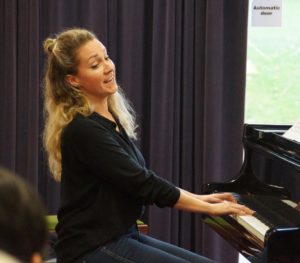
Rachel Fenlon accompanying herself in masterclass
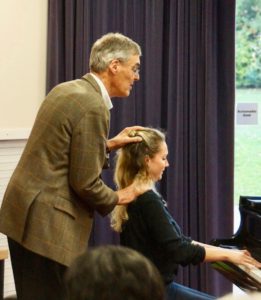
Rachel Fenlon with Roger Vignoles in masterclass
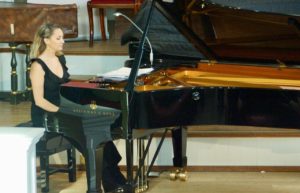
In final performance of Alma Mahler 1910 songs at Hollywell Hall, Oxford Lieder Festival
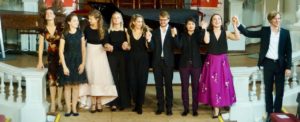
Final bows with the Young Artists at Hollywell Hall, Oxford Lieder Festival
Amy Grainger, Soprano - Orford Summer Academy
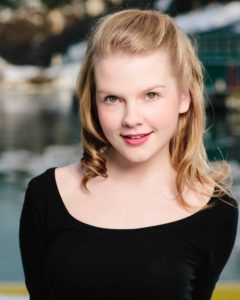
Being a classical singer requires much more than talent and passion. One must be intelligent, courageous, poised, and resilient. This wonderful career that I am working toward is for those who want to make the world a better place through beautiful music, and my three-week stay at Orford Musique was the latest step in my journey.
Week 1 — The Interpretation of Art Song with Rosemarie Landry and Francis Perron
I was delighted to spend the first week working with soprano Rosemarie Landry and pianist Francis Perron — two of my own teachers from l’Université de Montréal. We attended daily masterclasses (performing on alternate days) and had daily lessons with Francis. I worked with Rosemarie each day to prepare my programme for the semi-finals of the Prix Orford Musique.
My duet partners were Edward Enman, Félix Marquis, and Mehdi Ghazi. Together we worked in depth on the nuances and interpretation of Poulenc’s Fiançailles pour rire, which we performed in full on Wednesday, July 19, for a full church in Bonsecours, Quebec.
Week 2 — German Lied with Nathalie Paulin and David Lutz
My pianist Laurence Dussault and I were fortunate to work with renowned pianist David Lutz in a lesson or a masterclass each day, along with daily lessons with soprano Nathalie Paulin. We coached lieder by Schubert: Seligkeit, D. 433, Der Knabe, D. 692, and Du bist die Ruh, D. 776; and by Wolf: Der Knabe und das Immlein.
On Monday, July 24, I sang in the first of three semi-final concerts of the Prix Orford Musique. Of the twelve semi-finalists, I was the only singer: 7 pianists, 2 violinists, 1 flutist, and 1 bassist.
Although I was not selected as a finalist, I still took full part in all the activities organised for the competitors. I attended workshops and masterclasses, which covered topics such as “Classical music in the media in 2017” and “Entrepreneurship in music” with Caroline Rodgers, Le Devoir; Wonny Song, Artistic Director of Orford Musique; François Racine, Opéra de Montréal; and Emmy Tu, Dispeker Artists Inc.
Orford Musique made a video to introduce me before my performance: https://youtu.be/MUKPXfZJWZU
Week 3 — French Mélodie with Nathalie Paulin and Francis Perron
Laurence and I remained partners for another week, shifting our attention to French mélodie: Chanson d’avril by Bizet, Satie’s 3 Mélodies (1916), and Poulenc’s Métamorphoses.
Our daily schedules followed a different format this week: lessons with Nathalie and with Francis each day, along with daily ensemble classes and two masterclasses toward the end of the week. In the ensemble classes, we were assigned small ensembles and French duos/trios to learn and perform. This was a lovely exercise that I will add to my routine moving forward.
On Thursday, August 3, our entire class — including our teachers — performed at a benefit event on behalf of Orford Musique. We met the Artistic Director, Wonny Song, along with many important donors and sponsors of the Festival.
Conclusion
This immersion in art song was extremely valuable because it allowed me to deepen my understanding of how to approach a mélodie or lied, the importance of style and performance practice, and the choices available to us as interpreters of this beautiful genre. With each performance — and this program offered many performance opportunities — I grow more and more sure of my chosen career path.
I will continue working to absorb the information presented to me throughout those three weeks, to integrate it into my performing by forming healthy habits, and to truly inhabit the voice that I have worked so hard to discover during my intense Orford Musique experience. I am beyond grateful to the Art Song Foundation of Canada for supporting me in taking this next step toward a long and healthy career as a classical singer.
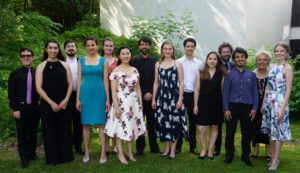
The big finale of Week 1 — Our class poses for a photo before our Friday afternoon concert
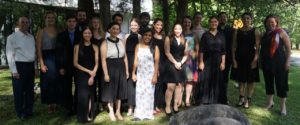
Our class photo from Week 2
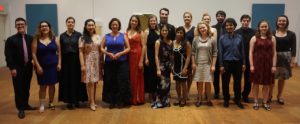
One more class photo after our Week 3 concert
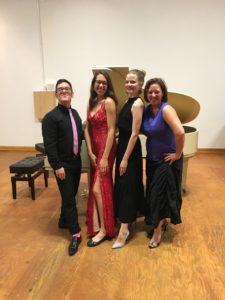
Laurence and I with our fabulous teachers after our Week 3 finale concert
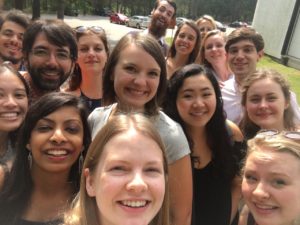
Class selfie before our mini road trip and benefit event performance

Soprano Amy Granger and pianist Félix Marquis
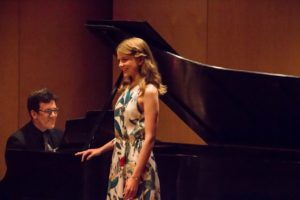
Soprano Amy Grainger performing in the semi-finals of the Prix Orford Musique with Francis Perron, piano
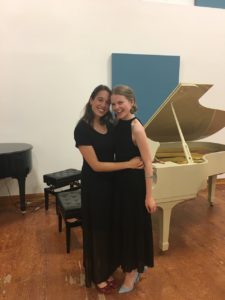
Post-performance smiles after our Week 2 concert with Laurence Dussault, piano
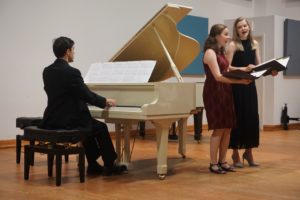
Performing with soprano Clara Krausse and pianist Martin Jacobs
![]()
Simone McIntosh, Soprano - Songfest
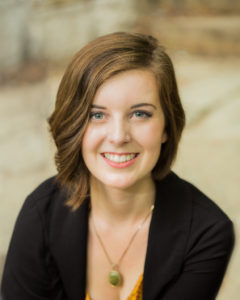
This summer I had the wonderful opportunity to attend SongFest at the Colburn School of Music in Los Angeles. While I was there, I worked with wonderful educators and colleagues who helped me increase my knowledge and inspiration of art song. In this report, I would like to highlight some of the more memorable moments.
I left Toronto very early in the morning of June 2nd with a good friend who was also attending the program. We discussed some of the things we were most looking forward to for the month and got some well-needed rest. We arrived at Colburn and were taken aback by the beautiful facilities. They were so new and well maintained — not to mention the great view of Frank Gehry’s Walt Disney Symphony Hall across the street. We had a quick orientation meeting that night, and were all set to sing the next day.
The first masterclass I performed in was the opening class with Martin Katz, where I performed Poulenc’s Voyage à Paris, which ended up improving, with even more detail added to the quick piece. It was quite easy to tell that he is a passionate man who cares deeply about the music and expected excellence from the participants. As a master in general, Katz’s goals of good text communication were met often, and we heard many moving performances from the students. I was fortunate enough to work with him in six masterclasses and one performance, which I will touch on later in the report.
One of my greatest passions as a musician is to work with living composers. I had the wonderful opportunity to do so with John Harbison’s fifty-minute set Mottetti di Montale. This was the premiere of the program, which included three mezzos and one soprano. We split the work among the four of us and performed the set all the way through (which had rarely been done previously). The pianist for this concert was Lydia Brown, who is definitely one of the best pianists I have worked with to date! She was meticulous with the score and I knew that at every moment she was tuned into what I was doing as a singer, supporting me beautifully. Similarly, working with John Harbison was wonderful. I have great respect for his music and was deeply impressed by how amazing his ear is! I hope that these working relationships will last for the rest of my career.
The second performance I gave came two days later with Martin Katz at the piano. Getting to work with him as a collaborator rather than educator was interesting in a good way. The working relationship was good, and he ensured that everything we were doing worked well for my voice and for me. The repertoire for this program consisted of Berg, Schumann, Strauss, and Schoenberg — some of my favourite repertoire.
Later in the month, Martin Katz had left, and Graham Johnson and Jake Heggie arrived to conduct their portions of the masterclasses. Unfortunately, I did not get to do any masterclasses with these artists; however, I did get to work closely with them both throughout the remainder of the program.
I admired Heggie’s approach to masterclasses and quickly realized how kind and genuine a person he is. I looked forward to working with him on a piece I was performing in an American Song concert (funny, since I am unabashedly Canadian). The piece was Edna St. Vincent Millay, a melodramatic song about a woman who says she cannot be like Millay, but gets carried away with the sexuality of the piece for a big dramatic ending. When I coached the song with Heggie, he was incredibly supportive of my pianist and me, and said he could not wait for the concert. The performance was so much fun, and I managed to snag a few photos with him at the end.
Also on this American Song Concert was another of John Harbison’s sets, which I got to work on with Lisa Stepanova, another fantastic faculty member. This set was quite different from the Harbison I had done previously, but I loved it just the same. In general, he writes challenging music, especially for the pianist; so I was very grateful that Lisa was so hard-working and talented! I think this may have been my favourite concert of the month.
Johnson is one of the more intriguing people I have ever met. He has a sort of knowledge that one can only dream of having, but he also conveys his message easily and with direction. I found him engaging and quite easy to listen to. I learned a substantial amount from him about the history surrounding the pieces we choose to perform. However, I never once felt as though he was condescending to anyone when a singer or pianist did not know the background of a piece off-hand.
I had the opportunity to work with Johnson on a program he had previously performed with celebrity singers designed to speak about Schumann’s descent into death. This performance was split among four singers and two pianists, while Johnson gave a lecture to tie the pieces together. I must admit that my knowledge of Schumann before this lecture-recital was pretty minimal. Following all of the coachings and the performance, I feel like I have a much better understanding of who he was as a person and how to relate to his pieces better. I will also add that the musicians I worked with on this project were some of the most musical and intuitive people I have gotten to work with, which was especially noticeable in the ensemble pieces we did. We’ve all agreed to try to make a touring quartet in America. (It may or may not happen, but it does show how much we all loved working with one another.)
The thing is I have failed to mention thus far are my peers. I don’t know whether it was the water or perhaps the magic of song, but everyone I got to know at SongFest was absolutely wonderful. I think I have made incredible friendships and relationships across North America that will last a lifetime. Not to mention that everyone was incredibly talented and shared the same passion for art song.
Songfest was all together a wonderful experience, and I am so grateful for the opportunity the Art Song Foundation gave me by helping support me go.
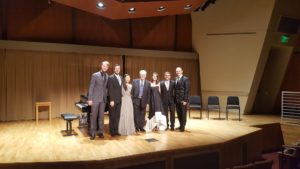
Kelsey Laureno, Lydia Brown, composer John Harbison, Chloe Schaaf, Simone McIntosh, and Anne Wright following a Songfest concert
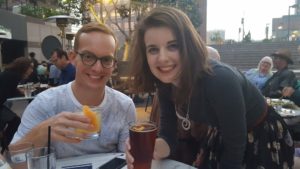
Simone McIntosh and pianist Geoffrey Conquer take a break from Songfest
![]()
Bahareh Poureslami, Soprano - Songfest & Toronto Summer Music Art of Song
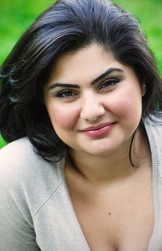
My Summer of Song
This summer I had the privilege of attending two wonderful summer training programs that focus on the great genre of art song: SongFest in Los Angeles and the Toronto Summer Music Festival’s Art of song programs.
I have always been drawn to art song repertoire because of the combination of poetry and music, something that is a big part of my own culture as an Iranian.
To spend so much of the summer working with my amazing colleagues and friends with teachers such as Martin Katz, Graham Johnson, Libby Larsen, and Soile Isosoki, among others, was extremely fulfilling and mind opening.
At SongFest I was lucky enough to take part in many masterclasses with a large focus on German Lieder. I have always found a connection and curiosity with German poetry that I have yet to find with other languages and so I requested that I focus on German works at SongFest and luckily that wish was granted. Having the chance to work on multiple Schubert songs with Graham Johnson was definitely the type of experience I was hoping for and one I will always fondly cherish and continue to learn from. Mr. Johnson’s love for life and music is at the same time jaw dropping and contagious and left me realizing that there is no other way to continue my work as an artist.
What’s wonderful about SongFest is that the students also get to work with living composers on their music. I had the chance to sing Ms. Larsen’s music for her in a masterclass and later take part in a discussion about music and its’ direction. It’s always exciting to do ones research and own guess work to try and accurately breathe life into a composers work, but it’s even more exciting knowing that the creator is right there and that the collaboration can be taken a few steps further. Having her discuss her own creative process and the different choices that each artist can make was very humbling and left me wanting to sing more music by living composers. As a lover of ‘old’ music, that’s a big step for me!
I left SongFest feeling like all the work I’ve put in during my singing career has been worth it and that I’m finally at a place where I can without shame or frustration admit that I have SO much to learn and explore. I could never possibly get bored or tired! Luckily I was able to head to another great program after, so no boredom here!
Because SongFest is a large program with different levels and age groups of musicians, I didn’t have much of a set routine for the four weeks I was at Colburn.
Toronto Summer Music Festival is much different. It is an intimate program for a small group of musicians working with a set schedule with the master teachers.
Besides the actual music part, my favourite part of summer festivals is the people I get to meet! I love people and their individuality and everything that makes them the artist and person they are. The group of twelve singers and pianists at the Art of Song program were all INCREDIBLE human beings with so much to offer. Not only did I learn a great deal from Steven Philcox, Martin Katz, and Soile Isokoski, but from my wonderful colleagues and for that I am grateful that TSMF has created such an open space for our ideas and personalities to grow and shift.
At SongFest almost all the concerts were put on by the students and that has it’s own excitement and joy. But once in a while we all need a little reminder of what it is that we are aiming for and luckily at TSMF I had plenty of chances to watch and listen to beautiful music played with brilliance, expertise, and passion by true masters. The highlights would be James Ehnes’ solo recital that left me with goose-bumps the entire time, being able to attend the dress rehearsal for the sold-out Bach concert and hear the teachers and students come together and breathe their own life into my favourite music, and of course the song recital given by Soile Isokoski and Martin Katz. Ms. Isokoski has this ability to make everything special and beautiful, but in a very unique way. She has more poise and elegance than I could ever hope for and watching her perform reminded me of how special language and culture really is. Because of her heritage and background we were encouraged to bring Nordic and Scandinavian songs to work on. I had never sung any Finish music before, but thanks to my teachers and a few books, I was able to choose a few songs and try my hand at this beautiful language. Having Ms. Isokoski there to help and guide us through this repertoire was truly invaluable and an experience I hope to repeat. But a great artist is more than just one genre or language, and that’s exactly what she proved to us. Her way of thinking and singing has so much wisdom and depth to it that once I started to get a hang of it, I realized I was making my life more difficult by focusing on the parts that would come together if I simplified and focused on the basics. That’s not to say that Ms. Isokoski’s interpretation or that music in general is easy and simple but that by overcomplicating ideas and concepts in our minds, we stray further from the heart of the piece and that honesty is what every artist should be seeking.
I always start my summer programs hoping that I will leave a better singer and artist. Maybe within two weeks I’ll figure out how to sing through this part of my voice with more ease, or to access this note better, or to have a better understanding of a specific poets works. And although usually I do leave satisfied that I have improved, I know it’s because I’ve grown as a human being. The kind of growth that is personal and intimate and can hopefully come across in my art. I will always and forever cherish this summer and know that without the help and generosity of the Art Song Foundation, I wouldn’t be quite where I am right now.
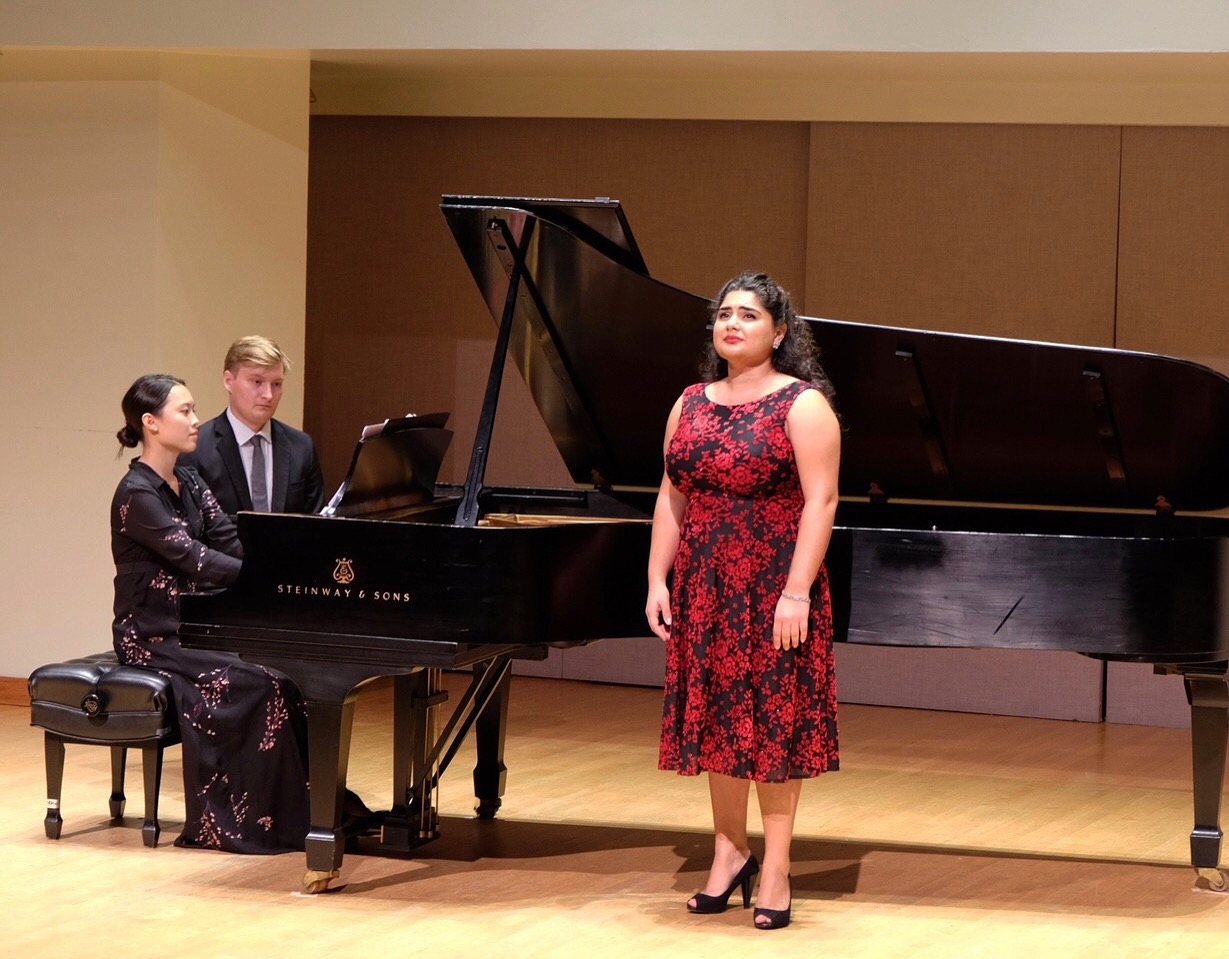 Bahareh Poureslami, soprano, and Amy Lee, piano, performing at Walter Hall on July 22, 2017, as part of TSMF Art of Song program |
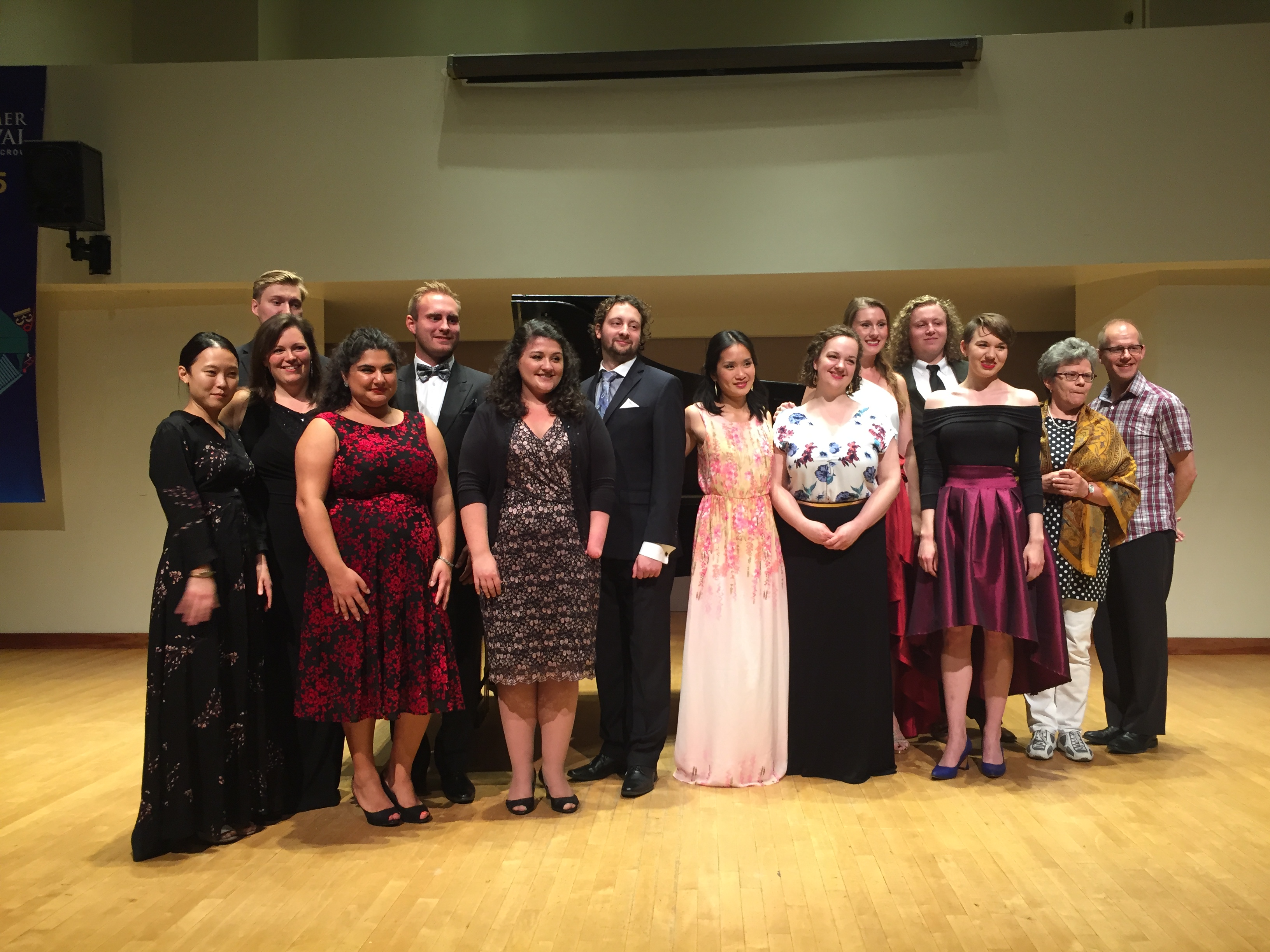 After the second Art of Song concert at TSMF |
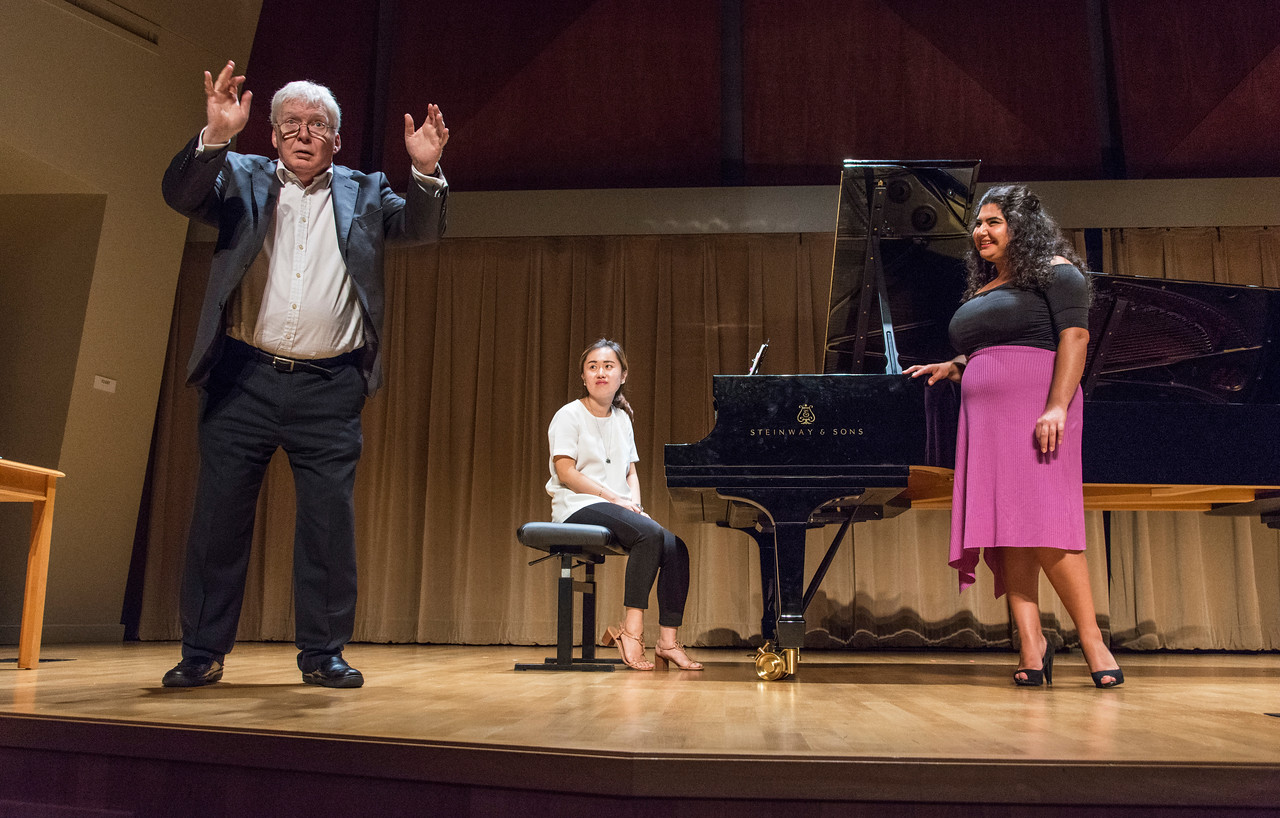 Bahareh Poureslami in masterclass with Graham Johnson at SongFest |
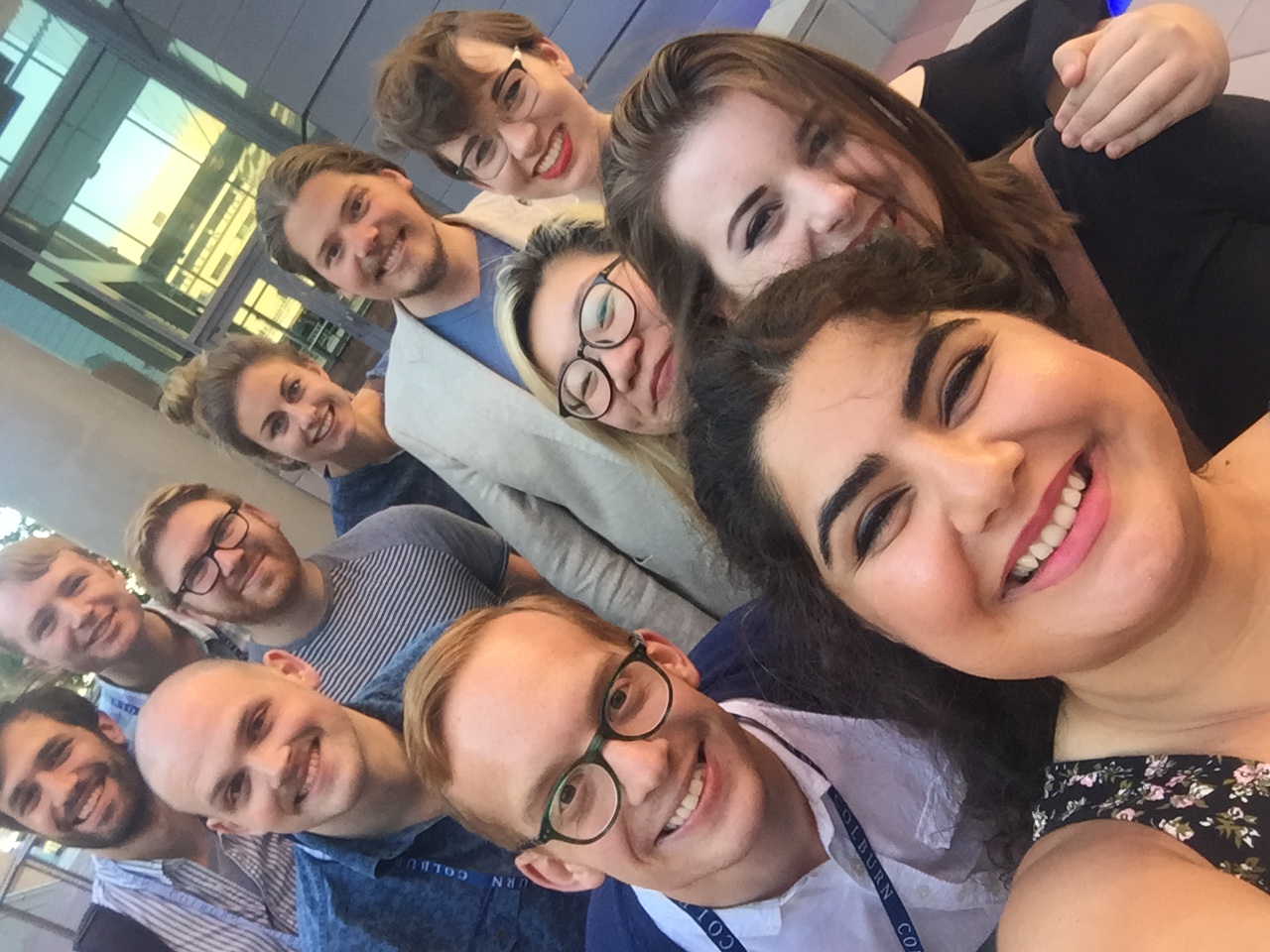 Singers and pianists (many Canadian!) enjoying their lunch break at Songfest |
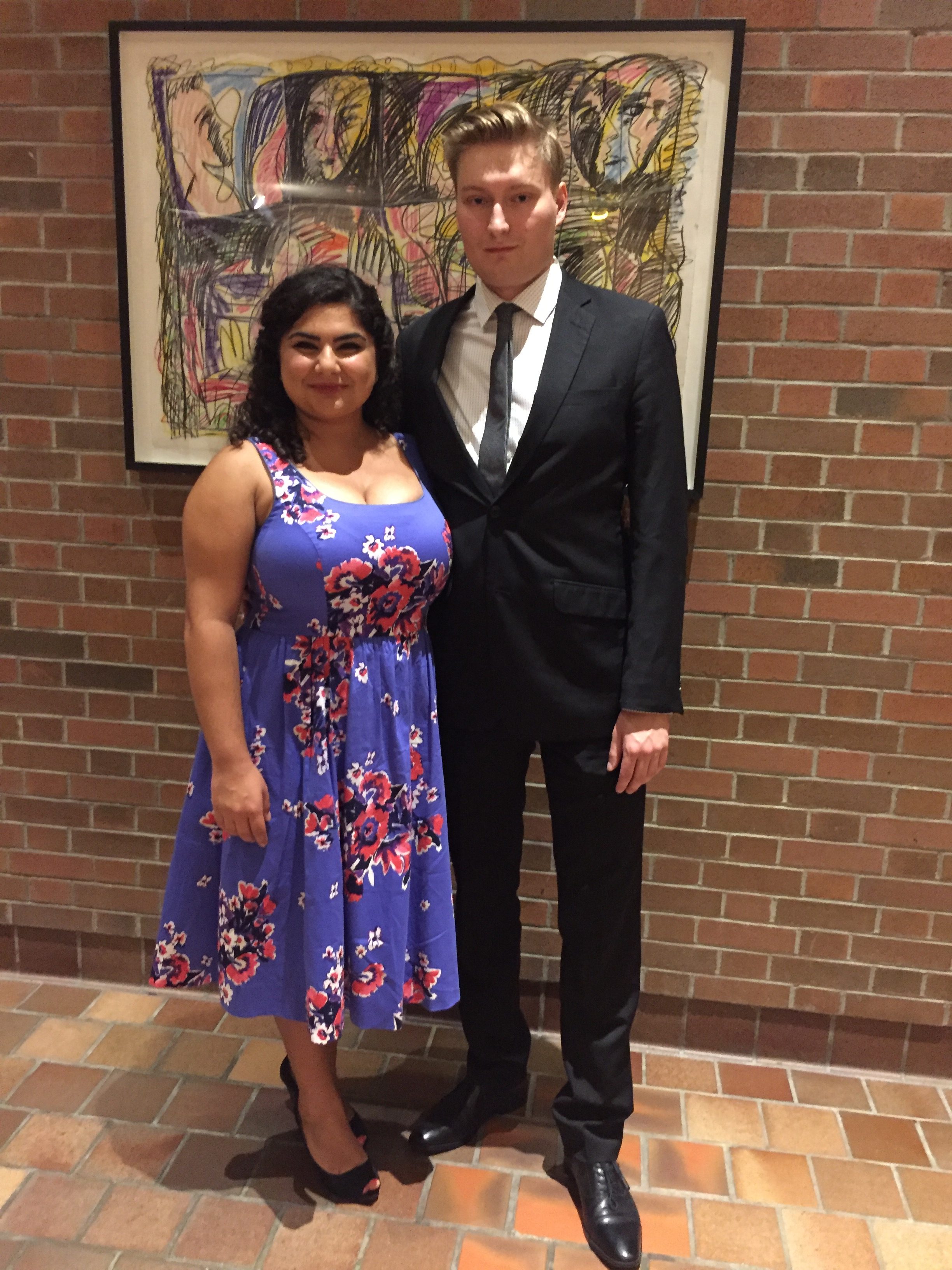 Bahareh Poureslami and pianist Jack Olszewski after their concert at Walter Hall as part of TSMF Art of Song program |
Alexander Soloway, piano - Académie Francis Poulenc
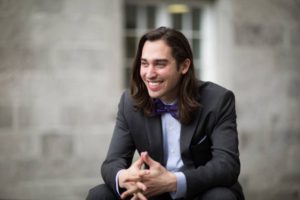
The two weeks I spent at the Académie Francis Poulenc this past August afforded me some invaluable experiences. This time spent engrossed in the French language, both colloquial and poetic, experiencing constantly its sounds and mannerisms, offered new insights into the art of interpreting and performing French song.
On top of this, we were given the rare opportunity to focus our thoughts on the words of one incredibly influential French poet: Charles Baudelaire. A greater understanding of Baudelaire’s universe throws light not only on his texts and their musical settings, but also on the words of all the canonical French poets who followed him and invariably were affected by his style.
I would like to thank the Art Song Foundation of Canada for making this experience possible for me, and I hope that I will demonstrate the value and necessity of this type of support for artists by continuing the great tradition of the French language, its poets, and its music, into the future.
Jonah Spungin, Baritone - Franz Schubert Institut
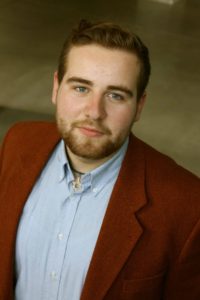 This summer, I was fortunate to receive a bursary from the Art Song Foundation of Canada to attend the Franz Schubert Institut in Baden bei Wien, Austria. Tuition for the program cost approximately $4,000 Canadian; so the ASFC’s support, as well as my bursary from the Austrian Society at McGill University, went entirely toward paying the tuition.
This summer, I was fortunate to receive a bursary from the Art Song Foundation of Canada to attend the Franz Schubert Institut in Baden bei Wien, Austria. Tuition for the program cost approximately $4,000 Canadian; so the ASFC’s support, as well as my bursary from the Austrian Society at McGill University, went entirely toward paying the tuition.
The program was an intensive five-week German poetry and song course in Baden bei Wien, which is about 25 minutes outside of Vienna by train. The program is run by Deen Larsen, who teaches the poetry course in the mornings, which is the crux of the program. Other than the poetry courses, there are usually two masterclasses per day, and each duo — singers and pianists are paired for the duration of the program — usually receives two coachings a day. It ends up being a very intense five weeks, with poetry seminar each morning from 9:00 to 10:00, followed by a masterclass from 10:15 to 12:45, coachings from 1:45 to 4:45, and then another masterclass from 6:30 to 9:00. This is approximate, as the schedule changes based on the day, but that is a general example, and there are no days off throughout the program. There are, however, specially programmed days with outings either to perform at or tour nearby towns and monasteries, and some long hikes in the Vienna woods, which were an absolute highlight of the program. Getting to walk the same paths that inspired so many great musicians was truly incredible. Some years, there is apparently a day trip to Vienna, though that was the only thing I might say was missing from my experience there.
The poetry seminar was, for me, the heart of the program, and learning to appreciate and look more deeply into the poetry of the songs we sing so dearly was a wonderful experience. Deen Larsen is an inspirational human being, and his earnestness and devotion to the art had, for me, the most significant impact. The second incredible thing are the coaches. Working with so many incredible people in such diverse fields — diction specialists, directors, actors, pianists, singers, and singing teachers — is such an incredible change from working solely with singers, as we often do in music schools. Each coach had the opportunity to get to know us so thoroughly throughout the course that the work we were able to accomplish in each coaching was incredible. The masterclasses are supposed to be the main draw of the program, and they certainly did not disappoint. Each visiting master has a wealth of unique things to offer, and I took away a lot from every visiting master.
I think the true beauty of a masterclass system designed to be so packed and so varied is that there is no time to become stagnant and no time to waste. Deen told us in the first week that we would soon get too tired and too stressed to be vain and he was right. Performing under all circumstances, whether prepared or unprepared, having slept or not slept, having had a fight with our partners or having made a new best friend, proved him right. By the second week, I found myself utterly uncaring about what the others were thinking and solely focused on making the best possible music that I could.
Another highlight of the program is the town in which it takes place. Baden is an old town that looks as if it could have been built yesterday. Knowing that you’re walking the same streets that Mozart and Beethoven walked is eerie enough, but having the opportunity to sing in the church for which Mozart composed his Ave Verum is a truly transcendent experience. There were many goosebumps and “Whoa!”s shared with my fellow participants in the program. The town is quite small and very welcoming to us. We had both the opportunity to improve our German, as the locals would all speak to us in German if we tried, but they could also all speak English if we were stuck. Also, due to the size of the town and the intensity of the program, we were always all fully immersed in it. There was little else to do but work and so we worked more than we might have if we’d been in a city like Vienna, where there is so much to do and see. If we wanted a break, the woods were there for us to hike through, or the famous springs for us to visit and bathe in, just as the Austrians themselves do. Of course, it is impossible to have a truly authentic experience as a tourist, but I truly felt that FSI gave me the closest version of that that I could have found as a singer in a country in which I’ve never lived.
The program is also designed to bring participants together in a way that I never could have imagined. There is nothing to be gained from competitiveness within the program, and so I found myself surrounded by support the likes of which I’ve never found in another group of musicians. I’ve never been so comfortable sitting in on others’ practice sessions or having people sit in on mine and exchanging ideas and feedback. The generally positive and open atmosphere was really special and, from speaking to some of the people who had done the program before, a characteristic trait of the Schubert Institut. I made friends there that I will have for life, and I learned so many things from so many different people.
All in all, I am extremely grateful for the opportunity to attend FSI, and I know, both from my own perspective, and from feedback from my professor and coaches at McGill, that I am a completely different singer, technically and artistically, after attending the program. It is an expensive program, but for the amount of education and experience crammed in, it was wellworth it, and I am thankful for the monetary support I was fortunate enough to receive, without which I certainly could not have attended.

A large number of the FSI participants on top of the castle mountain in Dürnstein right before a dip in the Donau
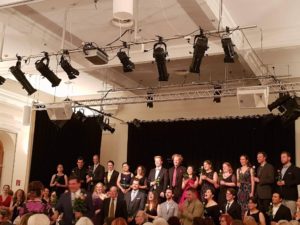
All the 2017 FSI participants after our final concert at the synagogue in Baden bei Wien
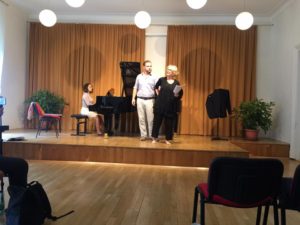
Baritone Jonah Spugin and pianist Achinoam Keisar with Birgid Steinberger during her masterclass
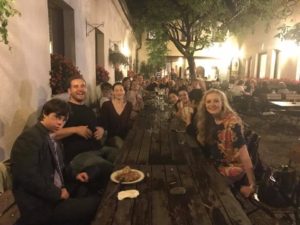
Many FSI participants at a Heuring, with Deen Larsen, the man who runs the program, at the far end of the table, and his son on the left
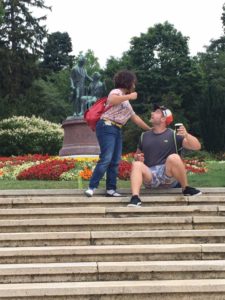
My pianist, Achinoam Keisar from Israel, and I re-enacting the statue of Lanner and Strauss behind us
